#i basically wrote a novel about how i love jackie
Text
so im watching yellowjackets
tl;dr i love jackie and i get emotionally attached to characters
and my deep love for jackie makes me worry i wont be able to finish the first season lmao. like unfortunately yellowjackets has been out for a while and i kinda gave up hope that i'd ever get the chance to see it(i dont have showtime and i dont have the money to afford like an account on whatever streaming service its on) so im unfortunately pretty aware of some of the character deaths but im more concerned that seeing how jackie kinda deteriorates will like affect me idk; i get really attached to characters and then when stuff happens to them i get hella feelings and this isn't just limited to tv characters like this has happened to me with books and videogames. idk if it's like my autism brain or what but i am worried my mental health might not be as great as it's been so idk if i should finish the season(im on episode 5) or if i should take a break.
#yellowjackets#jackie taylor#ember speaks#i feel really stupid#i basically wrote a novel about how i love jackie#and if anything happens to her#which i know it will#it will affect my mental health#yellowjackets spoilers#yj spoilers#yj
4 notes
·
View notes
Note
fanfic writer ask: director's cut for my love is otherwise
(Don't look at how it's been five days since I got this ask and nobody else remembers I reblogged that director's cut meme last week! Shh! Kayfabe!!)
We're talking about my love is otherwise, the colonial Australia mail order bride AU I wrote for The Terror AU fanzine in 2021.
Well now technically you already have the director's cut- the version that went into the zine was a hair under 6k, and the version on AO3 IS the director's cut, clocking in at 7,432 words of raw uncut linguistic hedonism, and cameos by James Fitzjames, gadabout émigré, who in my heart spends the time in which this fic takes place falling in love with grizzled paddle steamer captain Francis Crozier. (They're not relevant to this story but I do think about their forever unwritten All the Rivers Run AU from time to time.)
The whole piece owes basically everything to two fics: clear as western skies by mwestbelle and Came With Your Faith Unshaken by @drunktuesdayss; the former I read back in the halcyon days of 2009 and kept rattling around in the back of my head, inspiring Thoughts, and the latter I read while going through the Mail Order Brides tag as research, and which got me, sideways fashion, reading Best Friends wrestleboys fic despite not being even vaguely in wrestleboys fandom, not least because everything drunktuesdays writes fucking rips. When I pitched the story for the zine, I'd intended to also set it in a semi-mythologised American Old West, but not only did I struggle to not just completely steal setting notes from the fics I just linked, I dunno! I just liked the idea of setting it literally closer to home, and not putting these English lads into yet another American setting. There's not enough fic set in Australia, in my humble opinion.
Uhh what all can I tell you? The location of Edward's land is not specified very much on purpose, hah, but it's somewhere northwestish of Parramatta, roughly in the Baulkham Hills, Bella Vista, King's Park kind of direction, nebulously on a creek fed out of the Parramatta River. I do live in the Sydney basin myself, albeit a ways further east; at the time that I wrote the fic I didn't have my driver's license- god, that's weird to realise- so I didn't do this at the time, but if I were writing it now, I'd probably have gone and spent a day driving around to reacquaint myself with the Vibe, but I did not do that, so. In my defence, this fic is set in, roughly... uh now I actually don't remember? Early 1870s, I think? And the Vibe has changed considerably in the past 150 years. I spent a fair amount of time with my mother's historical architecture and decorating books to think about what Edward's house would have been like, a lot of which did not make it into the text; I laid it out much like the house I live in, which was built in 1889; my house is Italianate Victorian, rather than the blockier rural mid-Victoriana I went for for Edward's house, but it's not an uncommon layout, having two front and two middle rooms off a central hallway, kitchen/living/pantry area off the back. Again, a fair amount of reading that straight did not make it into the text, but which I like to think adds subtextual flavour.
Other stuff: in this AU, the real life suburb of Dundas Valley is called that because it's where Dundy lives; the background Fitzjames/Crozier thing that's happening, very offscreen; farmhands Tom Hartnell and Magnus Manson are having a soft boy sheepherding romance where they gently touch hands softened by lanolin and share bedrolls and so on; I can't remember if he got mentioned in the fic as it is, but somewhere nearby Irving and Malcolm are also sharing property and lingering glances. There's some flavour in here also from having read novels like The Thorn Birds by Colleen McCullough, Walking the Boundaries by Jackie French, and My Brilliant Career by Miles Franklin, but I don't know how much that comes through in the cross-dressing gay sex.
(yeah I dropped a reading list for my 7.5k smutty AU fanfiction I do what I LIKE)
3 notes
·
View notes
Text
Who are the “Venoms Mob?”
Well, first things first: if you go to China and talk about the 5 Venoms, or the Venoms Mob, they’ll have absolutely no idea who you’re talking about there, because that’s a fandom-term among US Kung Fu cult movie fans.

In Hong Kong, the Venoms are known as director Chang Cheh’s Weapons Expert Troupe, a group of five lifelong friends, martial artists, bodybuilders, exotic weapons experts, and trained acrobats who did at least a dozen movies for manly man Kung Fu director Chang Cheh in the 1970s and 1980s. They were the real deal: they usually choreographed their own fight scenes, which often involved flips and crazy stunts due to their acrobat training, high-wire acts, and unusual and exotic weaponry not typically seen even in martial arts movies. It’s like every single one of them drank the Captain America potion. Their films tended to end in heroic sacrifices, and the Venoms, for all their athleticism and daring, tended to be identifiable people on the bottom end of the societal ladder: homeless drifters, refugees, itinerant hobos, traveling performers, or restaurant workers.
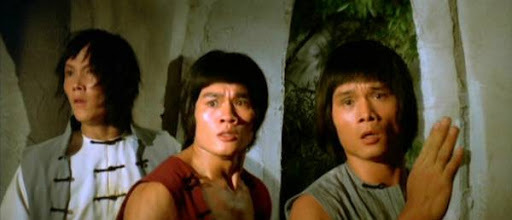
The Venoms were stars in the US, particularly among the black community who love Chinese martial arts movies, not just because of their truly breathtaking skill and choreography, but because they are how most people feel they are, secretly, deep down: rams among sheep. They are the poor, downtrodden, or average person who decides “not to take it anymore” after untold indignities. This is also why the Venoms are especially important to the black community. In fact, if you want to know how much the Venoms mean to their fans, just go up to nearly any Black Dad over 45+ and ask about the “5 Venoms.”
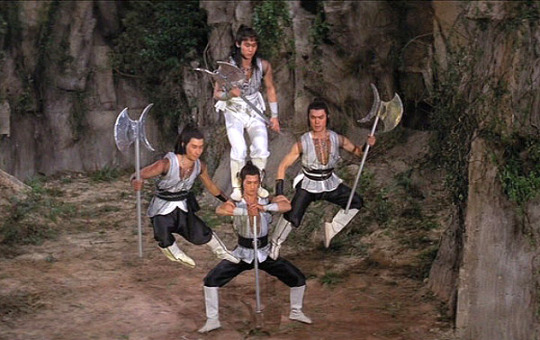
Chang Cheh, Director of the Venoms
The best way to describe the director and writer of the Venoms films, Chang Cheh is that he is basically Mac from It’s Always Sunny in Philadelphia if he decided to make Gladiator and loved Sergio Leone and Kurasawa.

The director and writer of the Venoms movies, and maybe the most significant name in the history of Kung Fu cinema apart from Bruce Lee, Chang Cheh was towering enough that Quentin Tarantino dedicated Kill Bill Part 2 to Chang Cheh in the closing credits. It would not be inaccurate to say he invented the Kung Fu movie as we know it, with its training montages, mentor-student relationships, all cut with themes of vengeance, noble self-sacrifice, and rebellion of poor and ordinary people against unjust authority.
Chang Cheh’s life story is fascinating. His father was a warlord during the Republican Era between the World Wars, which must have made for an interesting school career day. He started as a film critic and became a screenwriter, then from being a screenwriter, became a director. I wonder if that is the reason that Chang Cheh was so fascinated by themes of masculinity and male bonding, as the arty, openly gay movie critic son of a central Asian warlord had a nearly impossible standard of masculinity to live up to.

The two Western movies that are, thematically, the closest to Chang Cheh are Gladiator and Saving Private Ryan, and if you like both of those movies, you’ll probably like him. His heroes are often James Dean-like angry young men, poor and at the outskirts of society. His movies tend to end in heroic self-sacrifice for a noble cause, and tend to have themes of vengeance, arty blood red slaughter, and a distrust of authority and government of any kind. He loves bloodshed and thinks violence is beautiful; an image that comes up often is someone in an all white outfit that gets covered in blood, an arty view of violence similar to his two biggest influences, Sergio Leone and Kurosawa. Like the Shawshank Redemption, Chang Cheh movies are essentially ensemble pieces about the friendships and close comradely bonds of brotherhood between men. Very few women of any kind have extensive speaking parts in his movies.
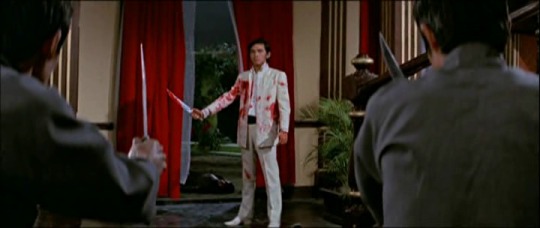
Another movie that also summarizes Chang Cheh would be 300. Remember that Sarah Silverman bit where she said that “300 is the answer to the question, how gay is this movie on a scale of 1 to 10?” Not just because it is about an entirely male cast, or about finding fulfillment in noble self-sacrifice and heroism Alamo-style against desperate odds, but also because it’s about glorifying the male body, with tons of abs and pecs. I suppose I should mention here that Chang Cheh’s movies are profoundly homoerotic, and discussion of their homoeroticism is the major way film academics talk about these movies. How many scenes in Cheh’s movies are about dudes hanging out with their shirts off, flexing their muscles? Or about “brothers” who clasp each other on the shoulder while looking longingly into each other’s eyes in a shot-reverse shot? The only meaningful relationship in his movies are male ones. I dislike passing on cheap gossip, but by all accounts it’s actually an open secret in the Hong Kong film industry that Chang Cheh was homosexual and lived with other men.

Yi Kuang -Screenwriter of the Venoms
The screenwriter of nearly all the Venoms movies, much like Chang Cheh, Yi Kuang had an interesting life. He was a Communist Party officer who went to Inner Mongolia, where his primary job was writing death sentences for landlords. Once idealistic, he left disillusioned with the Chinese Communist Party, and a remained a die-hard anticommunist. Evil bureaucrats tend to show up in his stories often for that reason, and a common theme of his scripts is the anger of ordinary people against distant, unapproachable authorities. There’s no understanding Venoms films without their screenwriter. Chang Cheh started as a screenwriter and wrote his movies, but Yi Kuang was his most frequent partner.
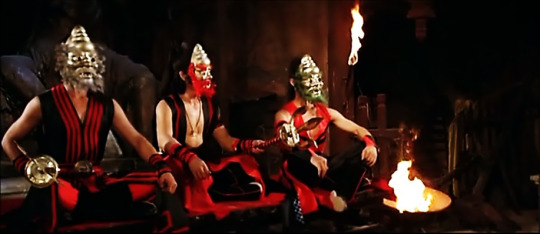
Interestingly, Yi Kuang got famous long after for writing a series of supernatural and horror novels called the Mr. Wisely books, where a traditional Chinese medicine expert fights for sites of power charged with Feng Shui. It’s interesting to see his turn to the supernatural, sorcery, and ghosts as an overreaction to his distaste for Marxist materialism. Of all the Venoms films, the one that shows his influence the strongest was the one the Venoms fight an evil human sacrifice devil cult, Masked Avengers.
The Hero – Kuo Chui
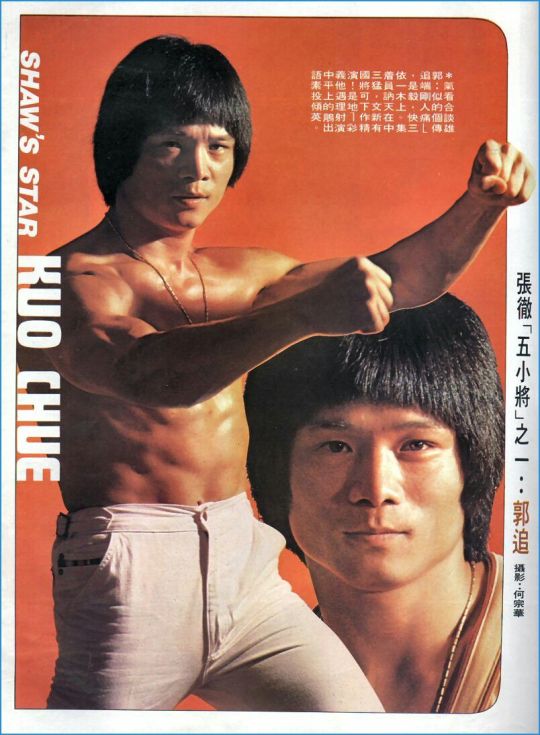
A guy with a big smile and a body carved out of marble, Kuo Chui started as a circus acrobat before becoming a stuntman and then a leading actor. He was the Venom with the strongest and most natural screen presence, the one that was the most “movie star.” In fact, he was almost always the hero and central character of Venoms movies, usually playing the most levelheaded and strategic minded of the group.
Kuo Chui deserves some credit also for being the one Venom to actually direct a movie himself, Ninja in the Deadly Trap. This sounds like a heck of a leap, but in Hong Kong, nearly all choreographers also direct their fight scenes. It’s no surprise that a common career path in Hong Kong cinema is to go from choreographer to director (see also Chang Cheh’s ex-choreographers, Tang Chia and 36 Chambers director Liu Chia Liang)
The Bad Guy – Lu Feng
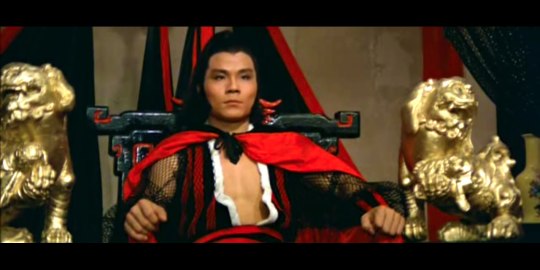
Every single movie, Lu Feng was the heel, the bad guy. I mean, heck, in Shaolin Rescuers, he even played the evil apprentice of the supreme supervillain of the martial arts, Pai Mei! But no matter what, Lu Feng was just so cool that you couldn’t help but root for him just a little bit. He was a character type common in pro wrestling: the arrogant “cool heel,” like Rick Flair and the Horsemen.
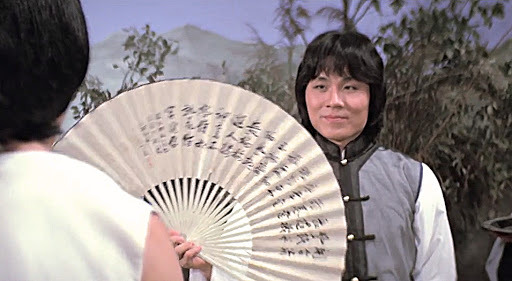
The Venoms tended to be workaday regular poor guys, but Lu Feng usually played a rich guy who oozed arrogance and menace, rather like the evil rich football player heel in college movies.
The Funny Guy – Chiang Sheng

A guy who usually played the funny young hero or a wisecracking comedy sidekick prone to wiseassery and pratfalls, Chiang Peng was the Venom who most benefited from the rise of Jackie Chan, and his introduction of silent film era inspired physical comedy into the otherwise stale Kung Fu film. Like Robin Williams, Chiang Shiang was someone who made everyone else laugh, but because he had a lot of darkness inside him, which ended up killing him. Chiang Sheng is the only Venom to not be with us, he drank himself to death after his divorce in 1991. Because of this, there can never really be a full Venoms reunion.

One of the most amazing things about Hong Kong cinema in the 70s is that the actors tended to have scraggly teeth that aren’t perfect and that seemed to be Chang Shieng’s defining trait. To be clear, I am not in any way mocking him for having bad teeth. In fact, I think it is rather winsome and endearing, like a teenager with braces.
The Tough Guy – Lo Meng
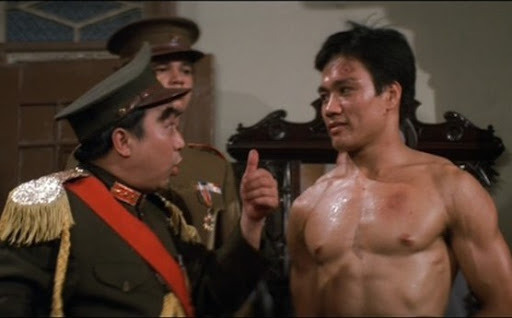
Known as the “Shaolin Hercules,” the person I’d compare Lo Meng to is Mr. Worf. Ultra-strong, humorless, intimidating, dead serious and never smiling, he was by far the most muscular and powerful of the Venoms, with tons of machismo and swagger, “big dick energy” as the kids say today. The camera tends to linger on his oiled up biceps and chest in extreme close-up…but was also, usually, the first to die in nearly all of these films. Much like how Worf was the toughest guy ever, but usually got beat up a lot so the writers could show that the situation was serious. In fact, Lo Meng, still in great shape, was in Ip Man 4, where, not one to break with a tradition, he was the first guy to get his ass beat in the film, even in a movie made in the Year of Our Lord 2020.

Lo Meng tends to be the “backup main hero” and was even the main character in films like 2 Champions of Shaolin. He had the most impressive “solo” film career apart from the other Venoms. Like Geri Halliwell, he left the Venoms to do his own thing, which is why the defining trait of the later Venom films is that he wasn’t there.
Lo Meng wasn’t Taiwanese like the other Venoms, and was a native of Hong Kong. In fact, he got his start in the film industry not as a stuntman or muscleman, but as an accountant for the Shaw Brothers studios, and he lifted weights and did Praying Mantis Kung Fu as a hobby. That’s…that’s hilarious. Reminds me of that fake Simpsons movie, Undercover Nerd with Renier Wolfcastle:

The Wild Card – Chun Shieng
Would YOU trust this man? I wouldn’t. He betrayed the Toad!

That’s Chun Shieng for you, the wild card Venom who could “go either way” and so wasn’t an entirely trustworthy ally.
Allow me to correct a misconception I’ve seen in a lot of places: Chun is sometimes known as “the one Korean Venom.” He isn’t Korean but Chinese, but he was trained in Korea and is a Tae Kwon Do expert, unlike the other Venoms, who studied Chinese Kung Fu and Peking Opera. And it certainly shows: he always fights with a kick-heavy Tae Kwon Do style that does not look much like any Kung Fu at all.
275 notes
·
View notes
Text
Fic Writer Questions
I'm bored and this was in a note on my phone from forever ago, so I must have been tagged at some point. Apologies to whoever tagged me. 🥴
1) How many works do you have on AO3?
52. Though, I used to have a few more. I deleted a few fics some years ago bc I hated that they were just sitting there unfinished. I was going through a particularly brutal bout of writer's block that affected both my fic writing and my RP writing.
2) What's your total AO3 word count?
720,782. And I was stressing about a 30-page thesis. 😂 (which ended up being over 15,000 words)
3) How many fandoms have you written for and what are they?
I started writing fic in 2000 with *NSYNC, Christina Aguilera, and Backstreet Boys fics. I stopped writing a bit around 2004-2007 (because of a stupid boy) and picked it up again in 2012 after reading some awesome Cherik fics and wanting to write my own FrostIron College AU when I read one that was good, but kind of disturbing. I think I write for one fandom -- Marvel -- but, like different factions of it. FrostIron and WinterFrost mostly, with a dash of Stucky, ThunderFrost, DashingFrost, and WinterIron.
4) What are your Top 5 fics by kudos?
Black Light Special (WinterFrost) - 628 kudos
Can I Bum A Ride? (WinterFrost) - 425 kudos
Empire State of Mind (FrostIrom) - 420 kudos
Dark Side (FrostIron) - 398 kudos
A Worthy Collection (FrostIron) - 309 kudos
5) Do you respond to comments, why or why not?
I really do make an effort to respond to every single comment, even the not-so-nice ones. I want people to know I've seen and read the comment they took the time to post, so even if I just thank them for reading and commenting, I respond.
6) What's the fic you've written with the angstiest ending?
Considering it features two -- count 'em, two! -- major character deaths, it's definitely Empire State of Mind. Though, I'd argue Dark Side is a pretty close second.
7) What's the fic you've written with the happiest ending?
Probably Ghosts That We Knew. It was the final fic in the trilogy that is the Picture Perfect Series. It follows Loki and Tony from when they meet in college and ends 30+ years later.
8) Do you write crossovers? If so, what is the craziest one you've written?
No, not really. And I rarely, if ever, read them. There's no real reason behind it other than I've just never come upon one and thought "ooh I need to read that."
9) Have you ever received hate on a fic?
Yes. I got a lot of hateful messages after I completed Empire State of Mind. People were really angry at me for killing off two major characters. I mean, a lot of the messages were "omg I hate you but I loved this!" kind of vibe. But there were a few that cussed me out and called me names for writing it.
I had some chapters of a Fools Rush In FrostIron AU posted a while ago, in which Loki was a female, the only daughter in both the Odinson and Laufeyson families. Following the storyline of the Matthew Perry/Salma Hayek movie, Loki meets Tony Stark in a bar and gets pregnant from a one night stand. Anyway, I got a lot of messages telling me that Odin's misogyny and mistreatment of Loki was unrealistic -- even though I had literally modeled his behavior after the movie that inspired it. 🤷🏽
I have some prompts done for the 100 Ways to Say ILY writer's block challenge and for one of them, I borrowed the storyline from an episode of Will & Grace when Will's father dies of a heart attack after they have a bad argument where his father basically admits he wished Will wasn't gay so he could have had an easier life. In the epsiode, the fight starts because Will's parents gift his baby blanket to Grace, who is pregnant with her ex-husband's child. Will takes offense, they don't understand why bc he never mentioned wanting children, and a fight ensues. Similarly, in my fic, Frigga and Odin offer a pregnant Natasha (his BFF) Loki's blanket. Some readers did not like this and did not understand why I would write it. In another prompt, one that was literally how my last relationship ended, got some harsh critiques. Those ones hurt especially bc it was such a personal experience I wrote about.
And I actually got into a fight -- like a screaming match -- IRL with my best friend's boyfriend at the time. One of my bestie's friends asked about my fanfiction and I gave them the gist of one of my stories where Loki has a brief relationship with Sif that results in a child and later reconnects with Tony. Later on, Sif offers to be a surrogate for Tony and Loki and eventually births three more children for them. Bestie's boyfriend could not fathom why a woman would purposely get herself impregnated and then give the child away. I tried to explain that this was a thing that a lot of women did IRL -- and some don't even use their own eggs, but the eggs of a woman who cannot conceive; Sif used her own eggs so that all four children were half related (two by Loki, two by Tony). But he just did not believe me and told me I must not be a very good writer. Worst night of my life.
10) Do you write smut?
I was just telling @teadrinkingwolfgirl the other night how when I first started writing fic I did not write sex scenes. It was always inferred or glossed over. When I started writing again in 2012, for FrostIron, it was my first time writing more detailed sex. I cite Jackie Collins as my smut-writing mentor. I've written almost exclusively M/M smut.
11) Have you ever had a fic stolen?
Not that I know of.
12) Have you ever had a fic translated?
Yes! Which is like the best thing ever! A couple of my older fics have been translated to Russian. I have one *NSYNC fic that was made into an audio fic. And someone recently messaged me on ff*net to ask to translate as many of my fics as they can to Spanish. :D
13) Have you ever co-written a fic before?
No, not technically. I've gotten a lot of prompts and ideas from friends and mutuals, and I started reformatting my WinterFrost RP with my ex from 2014-2015 into novel form a while ago. That's tecnically the only thing I've written with someone else and published.
14) What's your all time favorite ship?
I have two that will always, ALWAYS, have my heart and attention. FrostIron (Tony Stark/Loki) and WinterFrost (Bucky Barnes/Loki). They are the two ships that I write the most, read the most, and seek out fanart for the most.
15) What's a WIP that you want to finish but don't think you ever will?
Probably The Flame. It's a fic that starts out ThunderFrost (not related; Asgardian Prince Thor semi-rescues an imprisoned Jotun Prince Loki) but eventually ends up FrostIron. It's the only fic I've ever written that features Loki with both male and female biology. I have a few chapters done but I haven't worked on it in years.
16) What are your writing strengths?
I like to think I write realistic relationships. And I think my dialogue is also realistic and easy to grasp. And I put a lot of humor in between all the angst and hurt.
17) What are your writing weaknesses?
I think I get too detailed with background. I just reread my Picture Perfect series (which I do like once a year), and there are literal paragraphs of background that in Google Docs is like pages and pages. But I want to make sure people understand my characters! LOL
18) What are your thoughts on writing dialogue in other languages in a fic?
I'm a big fan of it. I featured a lot of Norwegian in the Picture Perfect series. And French. I think as long as it flows with the storytelling and it's not forced on the characters it can be really cool. It should be natural. I always leave a translation list at the end of the chapter or explain in-text what was said. Which I think most authors I've read do.
19) What was the first fandom you wrote for?
The Backstreet Boys. LOL. Don't judge. I started writing my own fics after discovering BSB fanfiction written by an author named Mistress Lynz. She wrote a lot of fics about bloodletting, but I really enjoyed the fics where the guys were hooking up with each other behind the scenes, LOL explains why I write mostly M/M now. 😂
20) What's your favorite fic you've written?
They're kind of like my babies so at different times different ones are my faves. But if I really had to pick one, I would say Stay With Me is my favorite. I got some of the most amazing comments on this story from people that found meaning and themes in the story that I didn't even realize I'd put in there. It was one of my first WinterFrost fics I'd posted and the response was more than I could have asked for.
And now I have to tag people! @teadrinkingwolfgirl @incredifishface @incubigirl @rabentochter @marvelswinterfrost and whoever else feels up to it.
xoxo
#fic writer meme#fic writer questions#all my fics#my writing#frostiron#winterfrost#stucky#thunderfrost#winteriron#dashingfrost
9 notes
·
View notes
Photo
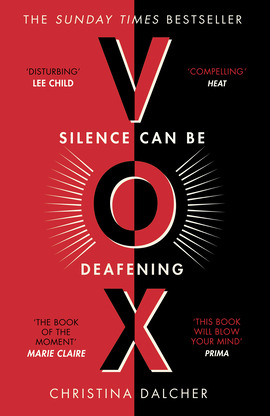
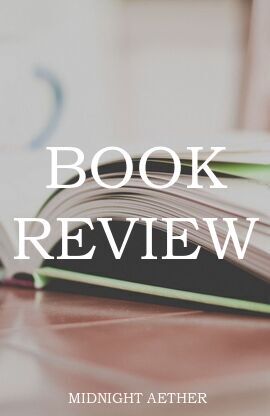
Why Vox by Christina Dalcher is not a good novel: Review & Analysis
The premise of this novel is incredibly interesting, don’t get me wrong: Vox (2018) is about a dystopian future, in which US American women are only allowed to speak 100 words per day and must wear a bracelet that shocks them if they go over that limit. Women also aren’t allowed to write, read or use sign language. The main character is a genius linguist called Jean who hates every man in her life, including her husband Patrick and her own sons.
The first sentence already tells us three things about this novel: (1) it’s told from a first-person perspective, which means the reader will be aware of the protagonist’s every thought, (2) the oppressive regime in the novel goes by the name of Pure Movement, so it’s probably going to have something to do with religion, and (3) the action takes place in the span of a week, which I feel like it’s a huge spoiler for the fact that I won’t care for any of the characters at the end of the book, since there’s only so much character development that can happen in that time.
If anyone told me I could bring down the President, and the Pure Movement, and that incompetent little shit Morgan LeBron in a week’s time, I wouldn’t believe them.
There will be spoilers from this point on.
The Setting and the Protagonist
The main character in Vox, Dr. Jean McClellan, is a specialist researcher in the field of aphasia, that is, according to Wikipedia, “an inability to comprehend or formulate language because of damage to specific brain regions”. At some point in the novel we are made aware that a colleague of Jean’s, with her help, has discovered a cure for aphasia, even though they are both linguists and neither a chemist nor a medical researcher. However, she was unable to publish this discovery, due to the conveniently timed sexist apocalypse that stripped her of all her academic titles, as the reader is often reminded.
Jean is married to her husband Patrick and has four children with him: three boys and a girl. Jean evidently resents every man in her family, especially Patrick and their 17-year-old son, Steven. Apparently they’ve all been very quickly indoctrinated to believe women shouldn’t be allowed to speak, so they treat Jean and Sonia, the daughter, accordingly.
There is a whole subplot about Steven, but it’s so plain and uninteresting that there isn’t much to say about it. Basically, he is all for the Pure Movement and their ideals of purity for women, but then still sleeps with his high school girlfriend and proceeds to tattle on her. When she is taken away to a camp, he realizes his mistake a leaves to save her. At some point he is captured by the Movement and ridiculed on TV. Jean doesn’t really care that he’s gone, but is pleasantly surprised when he reappears at the end safe and sound.
At this point, the Pure Movement has only been in power for less than a year and a half. This movement is very overtly described as a Christian uprising that originated within the bible belt and had spread to the entirety of the USA. The followers of the Movement also adopt overly conservative views on gender roles, marriage and sex, leaving very little doubt about the roots of the oppressive regime in Vox.
The Plot
The main intrigue in Vox begins when the brother of the US president starts suffering from aphasia after a “skiing accident” and the government comes to Jean for help, despite her being a woman in a society that literally won’t let women speak. Why do they come to her instead of going to any other male scientist? Because apparently Jean is the best linguist in the whole country... even though, as far as the government (and the reader) knows, she’s only been researching aphasia for a couple of years and hasn’t found a cure yet. Well, the author herself has a doctorate in linguistics (not in the field of aphasia), which brings me to my first problem with this novel: the blatant and, quite frankly conceited, self-insert.
You may have noticed that I wrote “skiing accident” in quotation marks on the last paragraph. That’s because it’s hinted a couple of times throughout the novel that the president’s brother was actually injured on purpose by the government, but this turns out to be false. Later it seems like he was never even injured in the first place, but this is never clearly resolved, as the character himself never appears “onscreen”; however, it’s not a cliffhanger that perpetually haunts the reader.
Back to the story: Jean agrees to help because, by taking the job, she and her daughter get to remove the shock bracelets for the duration of the research. The government then proceeds to give Jean one week (remember the novel’s first sentence) to produce a cure that, to the best of their knowledge, hasn’t even been found yet. If that sounds like a stretch, they even let her work with her old research team of three people, which is supposed to fully convince the reader that a week is a completely plausible time frame to discover, produce, test and approve a cure for an illness.
The Side Characters
This team is composed of Jean, her former colleagues Lin and Lorenzo, and their supervisor Morgan, who you might remember from the novel’s opening sentence. Morgan is apparently an idiot linguist who is very unfit for his position, which is supposed to show how twisted the society in Vox is, as they put the dumb people in charge just because they’re men, and silence the smart women. What it actually does is show that this version of the USA apparently only has a handful of linguists and no other skilled scientists.
This is the novel’s description of Lin:
Lin Kwan is a small woman. I often told Patrick she could fit in one of my pant legs – and I’m only five and a half feet and 120 soaking wet, thanks to the stress diet I’ve been on for the past several months. Everything about her is small: her voice, her almond eyes, the sleek bob that barely reaches below her ears. Lin’s breasts and ass make me look like a Peter Paul Rubens model. But her brain – her brain is a leviathan of gray matter. It would have to be; MIT doesn’t hand out dual PhDs for nothing.
Here we learn that Lin is small, not conventionally attractive (read: small boobs and ass), and finally that she is incredibly intelligent. For some reason, Jean finds it important to describe Lin’s curves, as well as her own, before mentioning Lin’s intelligence. No, this novel was not written by Michael Bay. Also, for representation’s sake, Lin is Asian and a lesbian, yet every other major character in this novel is a white straight person.
Well, there is another lesbian in this story, actually. Jean’s old college roommate, Jackie Juarez, who Jean hasn’t seen since before the machocalypse. We get to know Jackie through flashbacks: the novel tries to portray her as this loud, over-the-top feminist who often tries to make Jean join the rallies and protests against the growing Pure Movement. Alas, Jean chooses to focus on school instead of going to protests and forever regrets this, thinking that if only she had fought, she might have changed history.
I don’t know how to feel about this novel’s depiction of Jackie. She is made out to be a stereotypical feminist lesbian, who actively protests against the uprising of the Pure Movement, and yet whose efforts are in vain. Here is an excerpt that characterizes how Jean sees Jackie, and therefore how the reader is supposed to see her:
“You have to vote, Jean,” [Jackie] said, throwing down the stack of campaign leaflets she’d been running around campus with while I was prepping for what I knew would be a monster of an oral exam. “You have to.”
“The only things I have to do are pay taxes and die,” I said, not holding back the sneer in my voice. That semester was the beginning of the end for Jackie an me. I’d started dating Patrick and preferred our nightly discussions about cognitive processes to Jackie’s rants about whatever new thing she had found to protest.
Here you can see that Jean clearly dismisses Jackie and “whatever new thing she had found to protest”, and instead muses about what an intellectual she is. I understand that this is a flashback, and it’s supposed to show that Jean was wrong not to care about protesting the Pure Movement, but this is told from present Jean’s perspective, so it’s clear she still rolls her eyes at Jackie’s activism in general. It feels like Vox is trying to say that actively expressing your ideas and concerns is useless, since Jean eventually overthrows the government with science and not through activism – and it even takes her no longer than a week to do it, as we learn at the beginning of this novel. There is a lot to unpack here, but I still wouldn’t recommend thinking too hard about the ideas in this book.
Jackie only becomes relevant to the plot towards the end. At some point she is held hostage by the government, so that Jean is forced to finish her work. Why the government chose to kidnap Jean’s old college roommate who she hasn’t seen or spoken about in years instead of, say, her daughter, we will never know. In the end, Jackie is only there so that Jean can save her and “redeem” herself for not having been there for Jackie in the past.
Lorenzo, the last member of the team, is Jean’s love affair since way before the Pure Movement effectively took over. The novel likes to remind the reader that Jean is with the Italian hunk Lorenzo because she despises her husband Patrick, so that makes cheating okay. Eventually we learn that Jean is pregnant with Lorenzo’s child, so he offers to let her escape with him to Italy as his wife. Yet Jean can’t allow herself to leave without her daughter Sonia – she’s fine with never seeing any of her sons again, though. She considers this for a while as she works on the cure for aphasia.
The Ending
At some point during the week, Lin disappears (we later learn she was imprisoned due to big gay activity). Jean and Lorenzo announce that they’ve discovered the cure and even test the serum on a random neighbour of Jean’s who happens to have aphasia as well. Also, Jean’s mother had an aneurysm earlier that week and also started suffering from aphasia. The government is pleased with the results and take the serum away.
Later, Morgan, the supervisor, takes Jean and Lorenzo to a strange lab underground to have them further develop the cure. There they walk through a hallway full of chimpanzees in cages, and there is a bizarre scene in which Jean gets too close to a cage and is attacked by a chimpanzee. There is no purpose to this scene other than to shock the reader, honestly. Here, the novel briefly, yet disrespectfully brings up a very real woman who was mauled by a chimpanzee in 2009 and managed to survive (Wikipedia link, no pictures), by having Jean think something along the lines of “oh no, I don’t want to end up like her!” during the attack.
Jean is fine, obviously. We’re over 200 pages in and nearing the end of the novel when the first interesting development happens in the form of a plot twist: the government has been using their cure in order to create an anti-serum that gives people aphasia. Their plan is to create a more effective means to silence women, of course, since they wouldn’t be able to comprehend or formulate language any more. When Jean discovers this, she wants to quit, but is forced to stay when they reveal they’ve been keeping Jackie, Lin and Lin’s girlfriend hostage in the same building for this very occasion. And maybe also Steven back at that camp, but we don’t even care about him at this point.
The climax of the story arrives, and everything happens so quickly the reader doesn’t have time to digest it. I had to reread what actually happened at the end, because I couldn’t remeber it anymore. I’ll try to recreate the pacing of the ending in the following paragraph, so you can understand what I mean:
Jean and Lorenzo save the lesbians (who are the only likeable characters, so that made me happy), Morgan dies, I think, and they escape with the anti-serum. Patrick appears and decides to help, so they send him to the White House with an anti-serum bomb that suceeds, giving the president and all evil politicians aphasia. Patrick is killed during this, freeing Jean from their marriage and allowing her to escape with Lorenzo and all of her children, whom she suddenly stopped resenting. The Pure Movement collapses and all is well, thanks to... well, thanks to Patrick and Lorenzo.
Conclusion
Vox is a mess of a novel. The characters are unlikeable, the plot is badly paced and the ending is too sudden. I really didn’t care about what happened to any character at any point, which is incredibly disappointing. Additionally, there are many things wrong with the political message in Vox, namely the idea that all religious people are inherently evil and that men generally wish to control and silence women. The premise was good, the writing was fine, but the performance was terrible, unfortunately. Vox feels like it was rushed to come out in time for the dystopian fiction craze of 2017-18 caused by the release of The Handmaid’s Tale TV series. Hopefully we’ll see better work from the author in the future.
Blog | Goodreads
#book review#booklr#bookblr#bookish#reading#bibliophile#booklover#litblr#reader#book#books#review#library#feminism#anti feminism#radfem#sexism#vox#dystopian#dystopia#christina dalcher#vox spoilers#tw: death#tw: animal attack
7 notes
·
View notes
Text
I had another idea for Tentoo and Rose, and I had to write it up.
Summery: Clearly, if you’re going to be living in a new world where you can’t just always get away with psychic paper to get into places, you’re gonna have come up with an identity for yourself.
And that includes a name.
So, Rose and the Doctor have an afternoon to kill, why not figure out what works best for the guy?
The name I give Tentoo is pretty much my headcanon name for him, do with it what you will. Also, the names suggested are mostly for fun.
On with the fic!
--
To Name a Doctor
--
A thwump sound caught the Doctor’s attention from the banana he was peeling, and his attention was drawn to the puce folder in front of him. It was still weird that puce was the color for folders rather than manilla in this universe, but it was the little things that seemed to catch his attention more than the big things.
Like how the chips here were terrible and he was working on genetically modifying a root vegetable in order to make actual, good chips.
The Doctor looked up at Rose who sat on the opposite side of the kitchen’s bar, gently pushing the folder closer to him. “Dad wanted me to give you these yesterday, but I forgot them in the car last night.”
“And they are…?” He asked, opening it up to see documents that required him to fill out information.
“Well, they’re identification papers that Dad and I wrote up yesterday over lunch. You’ve been here for over a week now and you’ve done a number of things but have not given yourself an identity here.” Rose replied and the Doctor set down his banana, giving this a little bit of thought.
Yes, in just his ten days here in Pete’s World, he’s built himself a screwdriver, bought himself some clothes, pretty much moved into Rose’s room (though he technically had his own in the Tyler estate until he and Rose found their own place), and had gotten on Jackie’s nerves at least thirty nine times. Oh, and he was able to properly identify and disarm an alien gas bomb that Torchwood had discovered through a phone call with Pete.
But Rose was right, he had yet to do anything about giving himself ‘official’ documents here. Rose had her own made forever ago, excellent fakes, no one could tell that they weren’t real, which means he’d have to get himself some too.
“Hmm… do we have anything planned today?” The brunet asked as he looked over the papers.
“Nope.” Rose spoke, popping the P. “So, wanna lie on some documents?”
The Doctor’s grin rivaled the one his girlfriend shared, and he took the pen she offered him. She got up from her seat, saying she was gonna make them some tea and he nodded, looking down at the papers in front of him.
“Alright, let’s fill out the easy stuff.” He commented, quickly writing down his weight, height, hair and eye color for IDs and ‘updated’ information, before hitting the roadblocks. “Birth date… hmmm, what do you think works best? Christmas Day, or when the meta-crisis happened?”
Rose looked over her shoulder, confused. “Christmas Day?”
“You know, when…?” The Doctor raised his right hand, wiggling his fingers.
This got a laugh out of the blonde as she put the kettle on the stove. “Oh, that’s a good one! I’d say Christmas, I mean, technically it was the day you were born, both as the hand and as the new Doctor.”
“Well, actually, I was regenerated on that day in the Game Station, and we arrived back on Earth on Christmas Eve, but still, close enough!” The part-Time Lord wrote down December 25th on the document before frowning. “Okay, parents… technically myself and Donna.”
“Then put down John Smith and Donna Noble.” Rose snickered. “Oh, I bet they’d have real laugh about that.”
“Donna might! Before she’d get angry about it. ‘Oi, spaceman! I am not gonna be your mother, even if I did help make you’!” The Doctor spoke, putting on his best impression of the fiery redhead, which sounded way too much like her, so he quickly shut his mouth. Rose burst out laughing at this and he scowled, before laughing as well. He quickly wrote down the names before pausing.
“I do have to give myself a name. John Smith won’t work. I mean, it’s worked a number of times, but some people are so suspicious of how generic it is, ya know? And I’m technically another version of the Doctor, still him, but upgrade, in a sense.” Like Hell he’d say he was downgrade.
Rose shrugged. “You could be a junior, or a second.”
The Doctor made a face. “Hmm… I dunno… maybe I could try for a new name? Something a bit different. What do you think of David?” He asked, saying the first name to come to mind.
“Hmm…” Rose thought, looking him over. “You sort of look like a David, but we’ll put that in the maybe pile. What about Matt?”
“Nah, don’t look much like that. Peter?”
“No, not that. Alec?”
“I feel like that name would make me ruder than I already am. Anthony?”
Rose snorted. “No, that’s my brother’s name! Though, if you were ginger with that name… Crowley?”
The Doctor shook his head. “Don’t think I could pull that off. Corin?”
Both paused and made faces. “No, no, terrible name, you’re right.” He shook his head. “Somehow that sounds ruder than Alec! Cassiopeia?”
“Doctor, I know I probably won’t call you these names except around people who don’t know you’re the Doctor, but there is no way in hell I’m callin’ you that.”
The Doctor looked at her funny. “What’s wrong with naming myself after a constellation?”
Rose just looked at him, raising an eyebrow, crossing her arms with an expression that basically shouted ‘are you seriously asking that question’.
“Right.” He sighed, scratching his head. “Jack?” He joked and she laughed. “Nah, good point. Oh! Wait, I’ve got one! Wilfred!”
This got Rose to raise an eyebrow. “Donna’s grandpa?”
“Yes! He’s a good man, really enjoyed his company, got to spend some time with him. Did you know he got a star named after him after he discovered it? Amazing, real proud of that man.” The Doctor smiled softly, toying with the pen in his hands. “I hope he’s doing okay.”
Rose knew there was a quiet, unspoken addition to that, but she didn’t bring it up. “Wilfred is a good name; do you want that?”
“I was thinking that’d be my middle name. I might go with John as the first, for old time’s sake, but Wilfred is the middle name. And… Noble, for the last name?”
The blonde gave this a bit of thought, tapping at her chin. “John Wilfred Noble… I like it.”
“Sounds good enough to tag on Tyler to it in the future?” The half-alien grinned and Rose walked over, giving him a little shove before a kiss on the cheek.
“John Wilfred Tyler-Noble? I think that’s an excellent name. Just don’t be writin’ that down on that paperwork! Don’t want Dad asking us a million questions!”
“Oh come on, it would be hilarious to show my ID card to your mom and watching her reaction!” He got a punch to the arm, making him wince. “Alright, alright, I’ll save that for later.”
Rose smirked and kissed his cheek again. “Right, so, for now you just leave the Tyler part off until we get that far. But this looks pretty good, now, onto figuring out your birth year.”
“Oh, that’s gonna be a challenge.”
END
--
Just something short and sweet. I’m in that group of Tentoo fans that loves the idea that he took on Wilfred’s name and Donna’s last name, especially cause I’ve been looking into the side content involving Ten and Donna and how much he seems to enjoy the Noble family (yes, that includes Sylvia, to a smaller extent, I mean, he even pretended she was his mother-in-law in an audio adventure). And yes, Wilfred does have a star named after him, its from one of the novels.
I might make this a little series of one-shots of Tentoo adapting to Pete’s World, spending time with the Tylers, and exploring this universe.
Thanks for reading!
21 notes
·
View notes
Note
I'm obsessed with your blog and your art! You're extremely talented! And I love your view on John and Paul because yessss 100000% they had lives outside of each other and other important relationships. That's one thing I find confusing about mclennon. But I still like parts of it. I'm not sure if it actually happened but I do think there was tension. Do you think there was a romantic tension or any opinions on it
Oh wow, I’m glad you like my blog and art!! Thank you so much I got a dumb grin on my face. And I didn’t think someone would come to ask me for my opinion on that stuff, haha 😅 but it’s really nice!
And I love your view on John and Paul because yessss 100000% they had lives outside of each other and other important relationships
I’m so glad someone shares my sort of feelings on this 😭💕💕
So in my view, I don’t know if there was romantic tension! I can see why people think so because sometimes they would say stuff like this:
“PAUL: It’s like, uh, “We have to get back.” “We’re on our way home.”
JOHN: Yeah.
PAUL: There’s a story. There’s another one – ‘Don’t Let Me Down’. “Oh darling, I’ll never let you down.” Like we’re doing—
JOHN: Yeah. It’s like you and me are lovers.
PAUL: [reserved] Yeah. [pause]
JOHN: We’ll just have to camp it up for those two.
PAUL: Yeah. Well, I’ll be wearing my skirt for the show, anyway.”
[From the Get Back sessions]
But honestly? I think there was brotherly love, some sort of obvious connection, but I don’t think they were in love in the romantic sense. I think they longed for each other in 1969/1970, but because they were friends for so long--and such close friends--who were going through a not-so-clean breakup. You’d want that relationship back in the way it used to be. There were only four people in the world who could really relate to The Beatle experience, and two who knew what it was like to be Lennon/McCartney, right? So it was losing a friend, an immensely valuable one, one they had for so long and were so familiar with. And they said stuff like that to express how they really understood each other (hard thing to express...) or to respond to how the media portrayed them. But you can understand your friends without being in a romantic relationship with them. It would be difficult or impossible to fully explain their relationship because we’re outsiders, but I wouldn’t jump to ‘they were lovers’. Being great friends is still a beautiful story, I appreciate that. Sometimes I think the word ‘friend’ doesn’t fully encapsulate their dynamic, but I still think ‘lovers’ is something completely different. But anyway, that’s just what I think personally. Impossible to tell anything for sure haha.
Tangent: I know some of y’all say the ship was possible because John was bi or at least bi-curious. And yeah I believe he was bisexual/fluid in his sexuality, but being bi doesn’t mean you’re in love with your friends haha. I have a close (same gender) friend who’s pan and people at school will be like “are you in a relationship?” even thought we’ve said no and it’s kinda uncomfortable. Possibility doesn’t mean it... happened. I don’t think it can be used as evidence for him and Paul in particular, or else you can say it about any man John knew... Also, I believe Yoko when she said John never really entered a relationship with a man as he never found the right one because John literally said that, albeit in a lighthearted manner. (Extra tangent: I saw someone write that John would’ve come out as bisexual but the in the 1970s they didn’t have the word for it/John wasn’t aware of bisexuality. Whoever you were, you kinda undermine the fact John definitely ran in the scene where bi and other sexual orientations were relatively out. Here he jokes about hoping his baby to be bisexual lol. Anyway...)
I think my main opinion on the McLennon ship is that it’s nearly all speculation and interpretation, so it’s hard to discuss it. And I think some of the people who say it’s true want it to be true more than they want the truth (whatever it is), so much so that they’ll look past things that contradict it or will stretch their interpretations so far as to make it look like they were in love in the romantic sense. Sometimes people will post pictures of them looking at each other out of context or something as ‘proof’ of McLennon but it honestly makes me think of it as a parody. And I can see why shippers like it--it would be a gorgeous story and they had a great dynamic!! But I really don’t feel comfortable with people who claim it was 100% true. Because Paul has denied it openly and very clearly multiple times before. And he would know, I think. Plus other’s who write about John’s heterosexuality (like Cynthia for example). But, John can’t really respond. It feels nearly disrespectful and presumptuous to say you know about the lives of these two people if you didn’t actually know them, y’know? Especially because that, in particular, is such a personal issue. Sensational, even. And it’s also something to insert into biographies and to claim and a way to sell copies--I’m not saying that every author who claims it is being disingenuous, but I question people like Goldman. Because some of the people who support it will bring up straight false information to back it up. My basic view is that it’s fine to ship it as long as you don’t try to say you are certain in its reality. I don’t think the information is known to be able to say it’s certain.
Also, another one of my opinions related to ‘McLennon’ is that some of the fandom share made up quotes or stories as ‘proof’ for it. Support your ship, sure, but separate fiction from reality! These are real people. For example, I’ve seen this one posted a few times:
“Cynthia Lennon is a goddess, you know. Paul is a god. Aren’t I lucky to have such a religion?”
X
Not necessarily McLennon, but John calls Paul his religion. This is from an alternate history book called Walkin' Blues-Beatles At The Crossroads: An Alternate History Of The Beatles Novel (Jackie Lane). I also posted this one and asked if anyone knew the source for it:
“One night he was so drunk that I had to drag him away from the pub and bring him in a park to vomit. When he finished, he was upset so we sat on a bench. Still drunk and hesitant, he pointed his finger at a star straight above our heads and he said: ‘That is the star my mother dedicated to me and it has always been mine. But from now on it will be yours too, if you want. Its name is Mary Julia and every time you will at it in any situation, any moment, you will know that I’m there near to you and laughing about how queer you are. I will always be there, I promise, I will look at you from Mary Julia. And even the contrary because it’s our star, just ours, a star that belongs to two idiots that strum and that every night lie on a bench full of alcohol.’ I was flabbergasted and together we started to laugh. Some years later I looked at that star and I cried for the whole night. His laugh near me wasn’t enough to make me stop. But I realised that he kept his promise and it was beautiful.” [-- Paul]
X
Some people told me they were pretty sure it was from a fanfiction. Y’all, I wrote fanfiction too. I wrote a epistolary-like piece of fiction once. If someone shared it as a real quote I’d be fucking mortified lol. (Also, when I posted it asking for a source some people in the tags were like “I don’t care if it’s fake that’s beautiful” and I’m like how do you not?? That blurs the line between reality and fantasy and that’s terrible because they were live people like you and me at a point...)
Uhm I think those are my takes. Thank you anon for the ask!! Sort of an excuse to share all my thoughts that I figured no one cared for 😂😂 And I get people will disagree and that’s okay!! If you think there was tension, etc I can see why! In the end there were only two people out there that can really answer that.
#mclennon#John Lennon#paul mccartney#the beatles#opinión#the beatles fandom#fandom#anon#asks#personal#love ya anon!!#i know some of my mutuals are into mclennon and i respect that to be clear!!#(but at the same time i respect paul's word when he says nah) but i respect everyone#all of you#and#!!!i think it's a cute idea!!! i wrote fanfic and drew fanart of them like its obvious the idea of it is romantic#but in my head i always saw it as just an idea#i think#peace and love
12 notes
·
View notes
Text
How Batman: Soul of the Dragon Pays Homage to 70s Kung Fu and Bruce Lee
https://ift.tt/eA8V8J
Batman: Soul of the Dragon sets Gotham’s caped crusader in a vintage martial arts homage. Directed by Sam Liu, who also directed the animated movie version of one of the greatest Batman graphic novels ever published, Batman: The Killing Joke, this is the 42nd project in the ongoing DC Universe Movies series.
However, Soul of the Dragon is an original tale, not based on a precedent comic. Like the eye popping anime-style film Batman Ninja, this is a completely stand-alone story. Batman: Soul of the Dragon is yet another chapter in the many creation tales for Batman. It tells of his martial indoctrination and joining him on this adventure are three of the best martial artists within the DC multiverse: Lady Shiva (Kelly Hu), Ben Turner a.k.a. Bronze Tiger (Michael Jai White), and Richard Dragon (Mark Dacascos).
“It’s a 70s martial arts action-adventure drama with a great sense of humor,” says Dacascos. Like so many Hollywood martial arts stories, Batman: Soul of the Dragon is told in two time periods: the present-day problem and in flashbacks to the original martial arts lessons that offer solutions. It’s a storytelling motif that can be traced back to the pioneering David Carradine’s Kung Fu TV show and Bruce Lee’s iconic Enter the Dragon.
In many ways, Batman: Soul of the Dragon is a tribute to Enter the Dragon, when the Kung Fu and blaxploitation genres were at their height. Richard Dragon is an homage to Bruce Lee’s character ‘Lee’ in Enter the Dragon (just like in so many Jackie Chan films, the name of Lee’s character was the same as his real name). In some scenes, he dons a similar black catsuit as Lee wore when infiltrating Han’s subterranean lair but stops short from yelling ‘Wataaah!’ when fighting.
Enter the Dragon was a game changer for martial arts movies, but it was also in the wake of the popularity of spy films of those days, specifically James Bond. Enter the Dragon is also a spy film, and it came out at a pivotal time for the Bond franchise, the same year that Roger Moore took over 007 in Live and Let Die. The spy film genre was immensely popular during the Cold War of the ‘60s, but by the ‘70s, it was looking to reinvent itself to remain popular. Enter the Dragon had the potential to launch a spy franchise for Bruce Lee, but his untimely and shocking death cut that short. Tragically, he died just prior to the release of the film. In some ways, Richard Dragon makes us ponder what a sequel to Enter the Dragon might have been like.
With his groovy afro and jive talking banter, Ben Turner steals a page from the character of Williams (Jim Kelly) from Enter the Dragon too. Batman is faintly akin to Roper (John Saxon), a token white guy amidst a diverse cast. Even the funky soundtrack by Joachim Horsley echoes the music of Enter the Dragon’s composer Lalo Shiffrin.
“In the 70s I was very impressionable,” reflects Dacascos. “The music brings you right back to that time. I love it. I love Enter the Dragon.”
It’s ironic that Batman would honor Bruce Lee in this way. For many, the Batman TV show of the mid-60s was their first exposure to the Little Dragon. Lee’s earliest Hollywood role was Kato, the chauffeur of The Green Hornet, which became a spin-off series of Batman, running for a single season on NBC in 1966-67.
Who is Richard Dragon?
Batman: Soul of the Dragon is a complete reimagining of Richard Dragon. In the original comic storyline, Dragon was Richard Drakunovski, a Caucasian character. He first appeared in the novel, Dragon’s Fists: Kung-Fu Master Richard Dragon by Jim Dennis, which was published the year after Enter the Dragon premiered (Jim Dennis was a pseudonym, the combination of the two authors’ names Dennis O’Neil and Jim Berry). The character was later adapted to comics by DC.
In the original DC version, Dragon was a classmate of Ben Turner, both of whom trained under O-Sensei (played by the venerable James Hong in Batman: Soul of the Dragon). Lady Shiva was also part of this Kung Fu lineage. O-Sensei’s goddaughter Carolyn Woosan was Lady Shiva’s sister. After Woosan was killed, Lady Shiva was tricked into thinking Dragon was at fault and hunted him to take revenge. Eventually, the trick was foiled so Shiva and Dragon became allies, united against a common foe.
In the comics, the world of Batman doesn’t cross with Dragon’s until much later. Dragon goes on to become a trainer of many DC heroes, notably the first Batgirl, Barbara Gordon. In another story, he helps Batman rehabilitate after sustaining injuries from Bane.
In a later alternate narrative arc, Dragon’s title is usurped by his villainous student, Richard Diaz Jr. This is akin to the Richard Dragon depicted in CW’s Arrow and portrayed by Kirk Acevedo. Bronze Tiger also appears in the Arrowverse portrayed by Michael Jai White, so Batman: Soul of the Dragon marks his reprisal of the role in the animated DC universe (As a side note, David Giuntoli voices Batman for Batman: Soul of the Dragon; Guintoli is married to Elizabeth Tulloch, who plays Lois Lane in the Arrowverse, including the forthcoming Superman and Lois).
However, neither Drakunovski nor Diaz figure into this latest incarnation of Richard Dragon in Batman: Soul of the Dragon. Here, he’s more like a Bruce Lee clone, only cooler. Dacascos didn’t follow the comics or the Arrowverse depiction.
“Yeah, I did not know that at all,” he confesses. “The script was so good that everything I felt that I needed to portray him was already on the page….All of my information for the character I found in the brilliant script that Jeremy Adams wrote and the information that was given to me by our producers and our director Sam Liu.”
Nevertheless, Dragon was a dream role for Dacascos. As a longtime fan of Batman, his favorite live action portrayal was Michael Keaton.
“I love his interpretation,” he says with a laugh. “There’s a sense of humor that he has and he stands out.”
As soon as his manager and agents sent him the script, he was hooked.
“I saw the description of DC Comics, Batman, Richard Dragon. And then I just jumped right into the script and after just a couple of pages, I knew I loved it. And the more I read, the more passionate I was about it. Before I even finished the script, I’d already emailed my representatives back and said, ‘Yes, please, please, please. I want to do this.’” Dacascos was tickled to be cast as his Kung Fu brother. “I’ve been privileged to play a character that is friends with Batman,” gushes Dacascos.
Beyond being a bat-buddy, what really appealed to Dacascos was Dragon’s strong moral compass.
“He’s not ignorant to the fact that evil is there, always has been, is, and will be,” explains Dacascos. “But with his training and his apparent good heart, he is able to maintain that battle with the negative, with the evil and take it on, maintaining his open heart and his sense of humor. I think his sense of humor is a part of his armor. He’s able to deflect with whimsy of the situation. He is a very loyal student, he is a very loyal friend, and I think his force – what drives him – is his love.”
From Stunt Work to Voice Work
By casting Dacascos, White, and Hu, Batman: Soul of the Dragon goes that extra step by placing genuine martial artists into animated roles. Throughout his teen years, Dacascos was a genuine martial arts champion.
“The thing is,” says Dacascos humbly, “my parents are both martial arts teachers.”
That’s an understatement. His father is Grandmaster Al Dacascos, a pioneering master in America who founded his own style of Wun Hop Kuen Do. His stepmother is Malia Bernal, a noted champion and coach of many other champions like Karen Shepherd. “My brother and I were basically forced into our first martial arts tournament at age six.”
Dacascos began his acting career in martial arts films, several of which were groundbreaking. His earliest lead role was in Only the Strong which was the first film to showcase the Brazilian martial art Capoeira. Brotherhood of the Wolf was a unique French period horror Kung Fu mash up that completely broke the mold for the martial arts genre. Having such an extensive background in the martial arts informed Dacascos on how to approach the fight scenes.
“As a martial artist, all I have to do is just think about it and I’m feeling it again,” he says. “So that part felt like going back home. When we were doing the action sequences, I just gave myself space to move around and then take the direction from Sam Liu and went for it…It’s all in your head and in your heart, and of course in your breath.”
Dacascos loved how the fight scenes in Batman: Soul of the Dragon came out, so much so that he’s contemplating bringing it to live action in his own way.
“I thought what would be really fun for me to do is actually in real life physicalize the forms, that form that Richard Dragon does,” he says. “So I’m going to maybe make it a little challenge for myself and learn those moves in real life…I would love to be Richard Dragon in real life. He’s really cool.”
In many ways, Batman: Soul of the Dragon feels more like a creation story for Richard Dragon than a typical Batman story. Batman is almost a secondary character. With Marvel making such strides in diversity with Shang-Chi and the Legend of the Ten Rings anticipated for summer 2021, DC needs to up its inclusion game. Could this be a stepping stone for Richard Dragon to become his own franchise?
“I hope so,” confesses Dacascos. “I hope that Batman: Soul of the Dragon continues and we do a sequel or series.”
While he is hopeful that there’s a future for Dragon, it’s the spirit of Batman: Soul of the Dragon that he finds most motivating. Like the title says, it’s got a lot of soul. “The thing is, it’s so much more than that because of the lessons that the students learn in the martial arts sequences taught by the wonderful James Hong who plays O-Sensei. The lines that Jeremy Adams wrote are so profound, and like any great teachers, they transcend the martial arts. It’s so much more philosophical and deeper. So, the story has the martial arts action, but it has heart, and it’s sexy, and it still has a great sense of humor.”
cnx.cmd.push(function() { cnx({ playerId: "106e33c0-3911-473c-b599-b1426db57530", }).render("0270c398a82f44f49c23c16122516796"); });
Batman: Soul of the Dragon is a direct-to-video film produced by DC Entertainment and Warner Brothers Animation premiering on digital platforms on January 12, 2021.
The post How Batman: Soul of the Dragon Pays Homage to 70s Kung Fu and Bruce Lee appeared first on Den of Geek.
from Den of Geek https://ift.tt/3nzf5HJ
1 note
·
View note
Text
Eurovision 2010s: 25 - 20
25. Francesca Michelin - “No degree of separation”
Italy 2016
youtube
Man, we’re deep into the endgame and at this point every elimination starts to mentally hurt.
“Nessun grado di separazione” is a fantastic song. it is a moody, melodic, genuinely touching showcase of palpable social anxiety, brightened up by frivolous jiggles and Animal Crossing-inspired staging. 😍 Its lyrics tackle the subject of “falling in love” with disarming accuracy and poetic justice. When you fall in love with somebody, it really is a question of resistance, of trying to stay level-headed and rational, of trying to not speak from the mind, not the heart, and then flare of emotion lights up from the inside, carving a path in your chest, until
THERE IS NO DEGREE OF SEPARATION

THERE IS NO DEGREE OF HESITATION

THERE IS NO DEGREE OF SPACE BETWEEN US

WE ARE STARS ALIGNED TOGETHER

DANCING THROUGH THE SKY, WE ARE SHININ’

Hands down my favourite language shift ever. Each time Francesca delivers it, time stands still, as you take in the expanse of the universe, the beauty of love and the profoundness of life.
Naturalmente, Francesca is also a fantastic performer for me. It really pains me that she was less good in the Grand Final, because her SF performance was genuinely worthy of a top five spot on this ranking. Yet, at the same time, Francesca is clearly upset at herself that she was worse and god my overthinking, underachieving perfectionist-with-a-crippingly-fear-of-not-being-good-enough self can RELATE SO HARD to that. 😭

*YOU* ARE PRECIOUS, Francesca. Grazie.
Easily the best entry Italy have ever brought at Eurovision...
________________________________________________________________
24. Mahmood - “Soldi”
Italy 2019
youtube
...until “Soldi”. Alessandro is mah MOOD

What a delight “Soldi” was. Shame on me though. Between, all the madness of Hatari’s assholery, Serhat’s qualification, ZalaGasper’s interview gold, Bilal’s revamp, Michela & Miki’s staging miracles, Sergey’s struggles to keep his homosexuality under wraps, Duncan’s staging disaster, Jurij’s bedroom eyes and 2019: A Kate Oddyssey, I had completely forgotten about Mahmood.
Which made the rediscovery of “Soldi” all the greater. 😍 THIS 👏 SONG 👏 FUCKING 👏 SLAPS. 👏 even the B-material things such as the snappy camerawork, the arabic middle-eight and rhyming “Ramadan” with “Jackie Chan” are mindblowingly awesome.
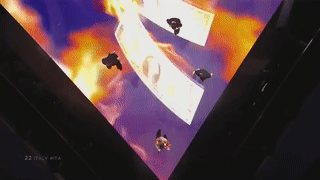

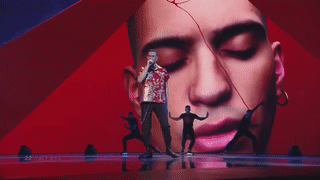
It hard to pick a favourite aspect though. The backdrop, the beat, the dancing, Mahmood’s vocals and miming all come together in a song that is supereffective in getting the pain across while also simultaneously remaining fun, addictive and highly energetic. Mahmood completely DISMANTLES bad parenting while also clowning the xenophobic pieces of shit that tried to bully him off Eurovision. It’s that combination of genuine emotional pulling, righteous ownage and let’s face it, a fucking amazing song that makes coming back to Mahmood for another listen the easiest decision ever. *CLAP*CLAP*, motherfuckers. 👏
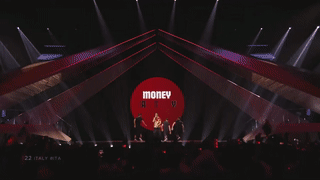
________________________________________________________________
23. Lea Sirk - “Hvala, ne!”
Slovenia 2018
youtube
[2018 Review here] (shared with ZiBBZ)
HVALA SLAY SLAY
Best moment of 2018: Lea Sirk becomes the best shock qualifier of ALL TIMES. Honestly, a trash fairy with a trap song that she wrote in under two hours has NO BUSINESS being this good, but it is. 😍
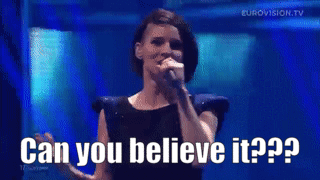
Remember the Israeli’s that cheered for Hatari? “Hvale, ne!” is the jury equivalent to that. It’s a song that righteously calls out the FAKENESS of the music industry <3 THAT WAS ALSO LIKED BY THE JURIES <333332456 😍😍😍
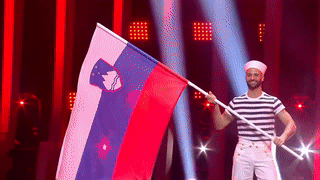
Besides this “Hvala, ne!” is a wild ride taking us to lands of cotton candy braids and trashbag couture with an impeccable, show-stopping choreography, an earworm of a beat and just general kick ass energy. Lea operates on a near-inhuman level of pure CONTENT. Every second she delivers something of value, be it choreography or a snarky note or a hilarious facial expression “Hvala ne!” is riddled with little nuggets like that, which are hard to list in text, so here are a couple of gifs:
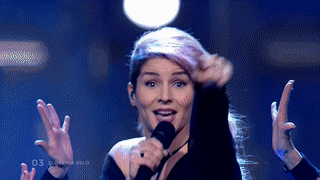
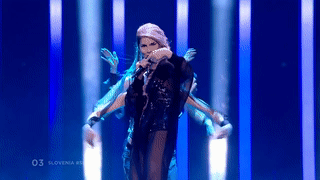

and yes, of course, the “break”. 😍
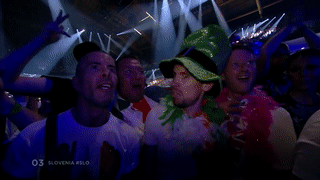
Being able to pull that off not ONCE, but TWICE and STILL making it look fresh and novel <3 “Hvala, ne!” is effortlessly sleek, unapolegetically non-conformist, shamelessly gimmicky and 100% pure awesomeness. Slovenia may be a tiny country geographically but they burst with raw TALENT. Obrigado sim!
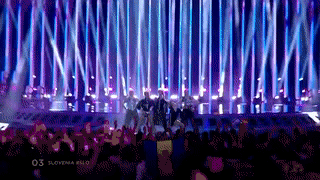
ps: Slovenia reportedly hating Lea now because she was trashtalking ZalaGasper’s victory over RAIVEN <3 lmfao Lea <3 ANGELS <3
________________________________________________________________
22. Who See - “Igranka”
Montenegro 2013
youtube
💃 Vodim te na IGRANKU 💃
💃 Na na na na IGRANKU 💃
💃 Ku ku ku ku IGRANKU 💃
💃 Vodim te na IGRANKU 💃
I should not get ahead of myself, but jesus fuck, what a TRIP.
So anyway, are Who See dressed like austronauts to signal that “Igranka” isn’t of this fucking planet, or? “Igranka” a fun party song, in which Who See tramp about dressed like Armstrong and Lightyear, flanked by 2013′s ubiquitous dubstep. Good? Sure.🤔 Funny? Certainly. 😁 However, nothing superexciting so far.
Until...

Who See go from a weird heteronormative rap effort that is lowkey fun to an utterly unhinged acid trip the SECOND Nina Zizic is lifted onto the stage by a dumbwaiter and then proceeds to collect every scalp in the gaylaxy. Remember how I said 2013 had EPIC female entrances? This is a top five entrance probably in the history of live performances. SLAIN, DECEASED, EVAPORATED every single time.

Europe’s cyborg seraph.
and I mean, you’d think this one-time gimmick would get stale over time, but “Ingranka” actually gets better with every listen. I’m at the point where I can NO LONGER resist the ululating siren call to don a visor and a pair of pvc wings, and make overdramatic shouty entrances everywhere just like Nina the few times I choose to leave my mother’s basement. VODIM TE NA IGRANKU.
________________________________________________________________
21. Cleo - “My Slowianie”
Poland 2014
youtube
CLEO... Donatan?
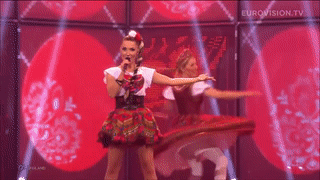
Is this Donatan shade for not being there? GOOD! We at BorisBubbles (so basically, I) believe in gender equality and since the wymyn do all of the work here, I’ve decided to not credit him. 🤭
Anyway, let’s just JUMP right in because dammit “My Slowianie” is such a RIDE. It’s entire objective appears to be... to convince everyone that ~Slavic Women~ are better, at everything than non-slavic women and, well, being slavic myself this message speaks to me. Not to mention that Cleo teaches us this paramount interculteral lesson in the most hilariously blunt fashion ever.
SPECIAL THINGS WE HAVE IN OUR GENES

MAKES US PROUD OF OUR NATURAL SHAPES

CREAM AND BUTTER TASTE SO GOOD

WE PREPARED FOR YOU DELICIOUS FOOD

OUR BEAUTY’S FAMOUS ALL OVER THE WORLD
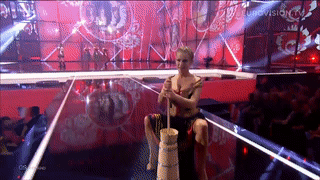
YOU GOTTA SEE FOR YOURSELF AND THEN YOU WILL KNOW 😉

and dammit Cleo doesn’t underdeliver, doesn’t she? Three minutes of loud in your face SUPERIORITY. 😍 One could argue that “My slowianie” is SOCIALLY REPRESSING WOMEN, like many terfs did but like... get over you -- Sophie Ellis-Bextor, BorisBubbles. I don’t think any of us have the right to tell (other) women what they can or can’t do because of their breasts and oestrogen. These ladies agreed to do this song/act and are completely facetious while doing it. It’s a spoof. Laugh. or don’t laugh, I don’t care, really. Be a humourless non-slavic frump if you must. As far as I am concerned, “My slowianie” is a thing of CHARMING BEAUTY :shakes what his momma gave him:/ :claps his hands to this music:
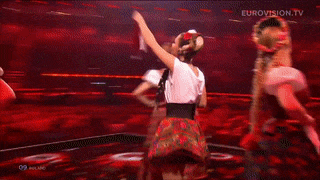

and in this update we say goodbye to Italy, Montenegro and Poland. Read my thoughts on them below:
ITALY

Italy before their return is one of the biggest snoozefests in Eurovision and now look at that chart. They were near impeccable in this decade and hopefully can win a third time soon (honestly the fact that they came so close to winning four times in this decade and still didn’t is one of the biggest mysteries of 2010s Eurovision imo.)
MONTENEGRO

Montenegro are the Georgia of the Balkans: they often go for experimental shit, just cuz they can. Unfortunately, their shit often is just that: shit.
POLAND

Poland at Eurovision is a big ball of meh, mostly because they can’t, at all, select songs or entrants that sound good. Cleo and Michal are forever though, so it’s not completely without merit.
#Eurovision#Eurovision Song Contest#Italy#Slovenia#Montenegro#Poland#Francesca Michielin#Nessun grado di separazione#Alessandro Mahmoud#mahmood#Soldi#lea sirk#Hvala ne#Obrigado nao#Who See#Nina Zizic#Igranka#Donatan#Cleo#My Slowianie#We Are Slavic#Butter churner
24 notes
·
View notes
Text
BDRP Questionnaire
1. Characters:
Jake Rogers, Monica "Mocha" Chino, Arista Triton, Haley Long, Megara Creon
2. Pick one of your characters and talk about their growth (we recommend choosing an older character, but it’s up to you!) What about their story has surprised you? What are you proud of? How have they changed from their original inception to now?
I’d be truly missing out if I didn’t discuss my oldest current character (since from before my triumphant return): Arista. Now Ris began as a twin to an old Adella. She was the sunshine to her moodiness and truly was naïve and entirely bubbleheaded. She grew into herself though, and that's what I'm most proud of. She went from being someone so enamored with love and going from one hook up to the next, but now I'm perfectly content with her being single. She had her heart broken a few times and then left and when I got her back I knew I wanted to mature her a bit. I wanted to make her a little more grounded and reason out the way her mind worked. The old Arista had her classic word mix ups ("Self-decapitating) and random bouts of train derailing, but I'd never truly dove into that. Writing her now, there's a certain way I've figure out how she talks, almost in a dreamy sort of way, when before she sort of had a bit of an airheaded valley girl-esque way of talking. This is partly due to the fc change (Allie Gonino the American vs Lily James the Brit) and partly to do with me remembering how British the Tritons are while watching Love Island. I think overall Ris has gone from an everywhere, energetic, hyper and sporadic party girl, to someone who floats from one place to another and sometimes that floating happens a little too fast and it looks like too much of a stretch to people who aren't paying too close attention. I'll always love my bubblehead beginnings, but she's developed into a character I can be extremely proud of and count on to bring the feels.
3. Pick another character and talk a little about where you WANT them to go. What are your plans for them going into the new year?
So going into the new year, I think Haley's gotta solidify her clique. She's still floating a little bit and eventually she'll have to choose a solid crew. I really want to get these current paras done so that follow up ones can occur in the new year and really develop her relationships with her friends. (Also I wouldn't mind a little teen romance as I have no idea which way the wind blows this fire). More Dragon things definitely. A lot more magical occurances and powers coming out at inopportune times. How will people knowing about her Dragon form affect her life? Will she be able to handle all her commitments and jobs? Who knows?
4. Pick a thread or a plot that you’re proud of and talk about why you loved it.
Sorry ya'll but I really gotta go for my HP plot. It had drama. It had comedy. It had socioeconomic talks with elves. It had chaos, secrets, intregue and poison. It had just everything. I'm pretty proud of it. It honestly remained an Alex plot through and through and is kind of the epitome of how I plan things and it was all from my glorious brain. (MK and Lauryl can tell everybody that I literally spammed them with my ideas for most of the week while the tournament was going on). In any case, really the pinnacle of my creation was Cappy the Elf. RIP Queen. You yeeted out of there Lord Farquaad style in a crispy blaze of glory, your ambition, revenge, and lack of education on ironic names was your downfall.
5. In terms of your own writing, identify 1-3 strengths and talk about why you think it’s one of your strengths.
1) Comedic timing. I've always kind of had a knack for timing things in a sitcom laugh track sort of way. I don't know if it was just growing up and watching Gilmore Girls and every other witty comedy under the sun, but ironic timing and strange turns of events that all somehow loop back together seamlessly just kind of happen.
2) Witty rapport (which leads to dialogue because that's my shit man, people talking). I mean, if anyone's ever seen me say anything on discord they know I've got it (even when no one wants it). Honestly voices always come to me before anything else. Whenever I get a reply I have an immediate knee jerk response in dialogue and then I build everything else after it.
3). Extended metaphors. I've said this time and time again but yanno, I love me a metaphor. Music or the sea for Ris. Animals for Jake. Really anything at all for Mocha. I just go on a symbolic tangent and I think it just enhances things.
6. In terms of your own writing, identify 1-3 areas of improvement.
1) Body movement and words for it. Most of the time I can see what I want them to do, but I can't figure out how to say what I mean without seeming basic.
2) Body positioning/facial expressions when talking. I get so focused on the words that I think I get a little repetative with the ways I describe facial features or like what they're doing with their hands while they talk.
See: https://www.youtube.com/watch?v=EQwJyE77ets
3) Smut descriptions. I'm real rusty fam.
7. Pick one of your plots, or even just a character, and come up with a list of 3-5 “mentor texts” where you can look for inspiration or research, then write a short (2-4 sentences) why you picked those texts.
Megara Creon
Medea by Euripides
A play about Ancient Greece which could provide inspiration for the relationship of Megara to her father. Medea involves King Creon as well as Megara as a minor character before she's married off to Hercules.
"Divine Comedy" by Dante
Provides inspiration about the circles of hell and the demons and creatures that can reside within them. This could be used for future adventures in dealing with other tiers of demons and contracts
Inferno by Niven and Pournelle
I loved this book as a high school student. Inspiration in the same vein of the divine comedy but its twisted into present day and modern examples of each circle and filled with all sorts of symbolism as you follow Carpentier. It's a way of interpretting hell as not just the big red fiery place
Anita Blake: Vampire Hunter by Jackie Kessler
This story is about a Vampire Hunter who becomes a succubus throughout the novel. Badass lady who becomes a succubus? Provides some inspo in the development of all that comes with the title as well as balancing life in the pursuit of a supernatural career. This series was based out of a gender inequality for women in detective and monster hunting positions in novels
8. And now, a wishlist! Jot down a few themes or stories or genres etc that you want to maybe pursue in the upcoming year! (i.e. a good ol’ fashion forbidden romance, maybe you want to dig deep into racial identity etc) This doesn’t have to necessarily be attached to any characters or stories you have now– it’s just meant to help you see for yourself what kind of stories call to your heart.
Teen dating/crushes/romance with Haley
Meg having to do research and going to various sorcerers and people who have ties to the darker demon sides of magic to figure out how to get her soul back/get rid of demon boi
Do some gigs with Ris and figure out how exactly I'm gonna convey her sound
9. OPTIONAL: Why do you RP?
I've always wanted to do more creative writing. I'm in a STEM profession which doesn't allow for much in that field. I've got so many random ideas for puns and jokes and things but no outlet for it. I wrote Fan fiction back in the day and when I came to rp for the first time like seven and a half years ago, I found a community of people who felt the same as me and who had the same interests and who supported me in a lot of ways.
BDRP came into my life when I was feeling real low. I was disconnected from all my friends and forced to move back home where no one was. I was working long nights and honestly just felt really down and depressed. Then one day, I was talking to Pet and she was like JOIN US. And so I did. And honestly, it gave me some real great people and some real great moments where I've truly felt like I wasn't alone and I was still good at something. I left because of school and I truly missed it and had some serious creativity overload without putting it to any use so I came back to my rp family.
I RP because it lets me focus on something other than the worlds impending doom, or my own future.
I RP because it lets me explore sides of my personality in slivers that I put into every character.
I RP because it lets me
I RP because I let me
I melt because RP
An absolute RP melt, that's me.
1 note
·
View note
Text
Writing Commissions Are Open
WRITING COMMISSIONS ARE OPEN - FAQ and Fandoms have been updated, the read more has been removed to make it more mobile friendly.
Popular Fandoms I’m Familiar With
Avatar The Last Airbender
Buffy The Vampire Slayer
Danny Phantom
DC Universe
Disney/Pixar
Doctor Who
Gravity Falls
Harry Potter
How to Train Your Dragon
Lord of the Rings/Hobbit (Movies and Books)
Marvel Universe
Miraculous Ladybug
NCIS
Percy Jackson And The Olympians
Sherlock
Twilight
Obscure Fandoms I’m Familiar With
Lucifer
Monster High
Strange Magic
Jackie Chan Adventures
Winx Club
WITCH (Mange & Cartoon)
Video Games/Online Games/Otome Games I’m Familiar With
Cardinal Cross (ImpQueens)
Dragon Age
Dream Daddy
Elderya
Mass Effect
My Candy Love/Amour Sucre
Rinmaru’s Ascension
Anime I’m Familiar With
Black Butler / Kuroshitsuji (Manga & Anime)
Dragonball / Dragonball Z / Dragonball Super
FMA & FMA:Brotherhood
Ghost Hunt
Inuyasha
Ouran High School Host Club
RWBY
Soul Eater
Pricing
Headcanons: $1 - $5 USD (varying on how many characters per headcanon, up to five characters)
Surprise Me!: $4 USD (Up to 2 characters + one sentence prompt + genre, varies between 100 – 500 words)
Drabble: $5 USD (Guaranteed minimum of 500 words)
Fics Are $1 USD Per 100 Words
Guaranteed Minimum of 1000 words: $10 USD
Guaranteed Minimum of 1500 words: $15 USD
Guaranteed Minimum of 2000 words: $20 USD
Etc
Additional Prices
NSFW: Add $2 to commission price
Crossover: Add $1 per fandom in crossover
Unfamiliar Fandom: Add $2 to price; unfamiliar fandoms will also take roughly a week longer, the price + longer time is due to needing to research/watch/ready anything I need to write characters correctly
FAQ
My story’s at 1506 words! Do I have to pay the extra pricing per word?
All extra words are negotiable. I will be lenient if I go over due to just being a few words over or if I happen to get really into the commission. But if you request more, then it’s on you.
Why does the pricing go up for longer stories?
The more words, the more time I am putting into the commission. Longer fics mean more time and effort, this includes editing, rewrites, double checking, and triple checking. You want what you’re paying for to be worth it and so do I.
I have this great idea for a novel…
I’m glad you have an idea, but no. I will not write your novel for you. It’s not fair to me, and it will cost you more than you’re probably willing to pay. Plus I have my own projects and novels to write.
I have a fandom OC, will you write with them?
Yes, as long as you’re willing to provide as much information as possible so I can write them properly without embarrassing myself or you.
I have a completely original character and would like you to write with them. Is this okay?
YES. But be prepared to give me a decent bio as well as physical descriptions and all the basic information. The more information I have, the more I can bring your baby to life.
Could you write ‘insert name here’s character with one of mine or yours?
As long as we both have the permission to use the character, then yes. Just like writing your OC, I will need as much information as possible on their OC to write them properly.
What kind of stories do you write?
Fanfiction mostly, varying on genre, though I do have some published short stories (some fantasy, some horror). I enjoy fantasy, angst, realism grittiness (particularly toward shows that gloss over serious subjects), and romance. I am willing to write almost any genre.
What won’t your write?
I absolutely will not write anything involving the following:
Vore
Children in sexual situations
Non-consensual sexual acts
Explicit abuse (very few exceptions – will be okay with most implied abuse, but not rape)
Anything romanticizing serious/traumatic events (includes Slave Aus)
I reserve the right to refuse a commission that I am not comfortable writing.
How does this work?
Message me with your intent and a brief idea of what you want. Once I approve, we discuss what length of story you want, what genre, what characters, a loose outline, price, and how long it will take me to get it done for you. We will exchange e-mails. Big info. Dumps (such as character ref. Sheets) will be done over e-mail so I can save them for quicker reference.
I send you my paypal link over e-mail and you can either pay half the commission price before I get started, or full price. Over the course of time it takes me to write your commission, I will send you updates, give you up to two paragraphs and/or dialogue at random to give you sneak peeks, and when it’s completed I’ll give you the final word count and total (if you choose to pay half up front, the total refers to what you have left to pay). I let you know it’s done, you pay the other half of the commission (unless you paid full upfront), and after full payment I will send you a link to the final product.
Will you be showing my story off to everyone else?
I do post everything to A03 and to tumblr. This is just a way for me to secure my writing so that someone cannot easily claim it as they wrote it by themselves. There can be exceptions and I can negotiate depending on the situation. If you don’t want anyone to know you’re the one who requested it, let me know and you can remain anon.
Side Notes
OC/Original Characters: Be prepared to give information regarding any and all Ocs involved
Please remember to stay in contact – I will contact you throughout the commission to make sure of the following:
That you enjoy what I have so far (I will NOT send the entire work, just small previews and information of how the story is moving along with up to two random paragraphs and/or dialogue)
To answer any questions I may have regarding your commission (keep in mind if I have a question about your OC, it will be hard for me to work on your commission unless you help and answer!)
#miraculous ladybug#my candy love#elderya#gravity falls#lucifer#monster high#avatar the last airbender#danny phantom#buffy the vampire slayer#harry potter#twilight#doctor who#how to train your dragon#ncis#rwby#witch#w.i.t.c.h.#winx club#strange magic#commissions#writing commissions#wastelandspectrecommission#commissioninfo
68 notes
·
View notes
Text
400 pages into Cosmic, the plot picked up rather fast so here’s a short (’short’) recap of what’s been happening
As a foreword: the JDC books have weird chronology, so while Cosmic was released first, it takes place in January 1994. That’s two months after Tsukumo Juku solved the Geneijo case in Joker (solved it on the day of his 20th birthday, no less: 31.10.1993), and fourteen years after Ajiro Souji and 6-year-old Juku solved The Saimon Family Murder Case. (This chronological mess actually causes Seiryoin to spoil the other books in this. Which I understand, because the tragedy that was Geneijo influenced a lot of character development of the detectives.) After Geneijo, in December 1993, Juku traveled to England to help with the case of Jack the Ripper’s copycat, ‘Jackie the Ripper’, and since he’s still caught up in that case when Cosmic starts, he can’t (yet) go back to Japan to help Ajiro with the Locked Room Lord case. (The real reason is probably that Tsukumo Juku is like Son Goku, if you don’t carefully keep him away from the plot he’ll solve it in five minutes and there goes your tension)
---
So, the second part of the book starts with that thing I quoted about an unnamed mysterious androgynous stranger in a non-disclosed location sending a package with non-disclosed contents to JDC. (Hm, who can that be?)
Then we mostly follow Ajiro Souji, the JDC representative and a telephone detective, who’s having a very bad time. As if the initial murders and Pyramid Mizuno dying wasn’t enough, there’s also the thing where a guy they suspected to be the Locked Room Lord died in the locked room no. 20, and his place had evidence that he knew about the victims beforehand (but how?...). And then one of the newest victims of the Locked Room Lord is just a kid, murdered nowhere else but in Geneijo. That coincidence (or is it?...) spooks everyone in JDC, especially given that Souya -- Ajiro Souji’s son and the assistant of Ryuuguu Jounosuke -- was murdered there during the case just months earlier, and the wounds are still fresh.
(So basically, in 1980 Ajiro solved the Saimon Family Murder Case that had claimed Juku’s family including his birth parents, and then in 1993 Juku solved the case that had killed Ajiro’s son. It’s almost poetic, in a very tragic way...)
Anyway, stressed and exhausted Ajiro falls asleep and has a dream where he talks with Tsukumo Juku, who I guess is how his subconscious is showing ‘reason’ to him (Descriptions of their long-lived intergenerational friendship and mutual trust are really great, btw. Ajiro even notes that just hearing Juku’s voice is enough to calm him down completely, and that everytime they talk on the phone they’re both so happy as if they haven’t heard each other in years. Aww. Ajiro may be sort of a paternal figure to Juku, but it’s too early to tell for sure.) Anyway, dream!Juku tells Ajiro that to solve the current case he should ‘think backwards’, that is, think about the distant past; even more distant than the Saimon family case.
---
Upon waking up Ajiro is told that JDC got a mysterious package: a manuscript signed by a famous detective novel author Dakushoin Ryusui (濁暑院溜水). There are two problems here. 1) Dakushoin died in Geneijo, and the detectives even saw his corpse, and 2) the manuscript describes the first 19 locked rooms... including the ones that happened just hours prior to getting the package.
Other parts of the manuscript are 3 stories happening in 3 different times: in the Heian period, Edo period, and at the beginning of the 20th century. (It seems that what the dream!Juku told him about ‘distant past’ was true, huh.) The first two talk about alleged historical events when a ‘vengeful ghost’ called the Locked Room Lord caused the death of 1200 people each time, the third is about the famous mystery writer Edogawa Ranpo trying to uncover the truth about these events. The latter two stories feature a hundreds of years old man, Hikami Sensai, who relays the previous Locked Room Lord cases to the protagonists by giving them the previous written down stories.
Oh, and then there’s that part of the manuscript that talks about the future, predicting that JDC will fail to solve the case, the Locked Room Lord will complete his plan of killing 1200 people in a year, and then on New Year 1995 JDC will get another message from him that in that year, as well, 1200 people will die...
Ajiro is really spooked now. Soon after, when he calls Juku and discusses the contents of the manuscripts with him, they both suddenly realize they did briefly meet an old man called Hikami Sensai before -- fourteen years ago, right after the Saimon Family Murder Case. (There’s a very cute flashback, with Ajiro telling li’l Juku that he will surely one day grow up to be the pillar of all the detective work in Japan. Juku looks at him in a silent promise, his eyes shining with determination. I can’t overstate how much I love their relations in this.) They also talk about how the Jackie the Ripper Case and the current Locked Room Lord Case may have something in common, but we don’t learn the details.
---
Soon, Ajiro sets up a meeting to discuss the manuscript with other detectives. We meet the rest of the usual JDC cast, among them:
-- Hikimiya Yuuya, the statistics guy with a vast knowledge of mystery novels, usually Tsukumo Juku’s assistant (not now, since Juku’s abroad)
-- Ryuuguu Jounosuke, the cryptography guy who wears all black, refers to everyone with very polite suffixes while talking about himself in third person, and while he looks really young he’s actually a few years older than Juku
-- Kirika Mai, who mainly uses reasoning by elimination, who’s trying to figure out who her parents were (they died when she was a baby), and who holds Juku in very high regards after he saved her and helped her get into JDC
-- Tsukumo Nemu, Juku’s younger sister by adoption (ie. she’s a Tsukumo by birth, Juku is a Tsukumo via being adopted by Tsukumo Ranma), whose reasoning is more based on ‘vague feelings’ about what happened than precise facts. She’s 18 in this book. She and Kirika seem to be great pals and work as partners, probably because tagging along through the Geneijo case made them understand each other
-- Amagi Hyoma, who mainly drinks and sleeps a lot and I’m not sure what he’s even doing there
We also meet some not-detective assistants, as well as a bunch of police officers, including Tetsuko, an older sister of one of the Locked Room Lord’s victims.
Working together (mostly using Ryuuguu’s cryptography skills) the detectives discover that the names of the victims are all anagrams or otherwise wordplays on the names of the characters in the manuscript. It seems that whoever wrote it was either the murderer, or somebody who knew about the murderer’s plan, and encoded the victims’ names in the charactes’ names as a sort of ‘key’. The question is who wrote and sent that manuscript; Hikimiya (who’s a mystery nerd and read all of Dakushoin Ryusui’s books) believes it was written by Dakushoin judging by the style, word choices etc., but Dakushoin is dead (right?), so what’s going on? Some parts of the manuscript are different than reality, eg. the names of the victims, or that time a guy in one of the locked room stories calls JDC and talks with Ryuuguu -- in reality it wasn’t Ryuuguu, but a guy called Yaiba who picked up the phone. So maybe the writer lost contact with the culprit after some time and just guessed stuff? This entire mess is confusing to everyone.
At the point I stopped reading, the detectives all pair up and start serious investigation, chasing clues needed to discover the truth about the manuscript in many different places -- Dakushoin’s own house; Geneijo; the place where the guy suspected to be the Locked Room Lord lived that apparently has photos and maps related to the victims; a historical literature university group that can probably tell whether the Heian and Edo parts of the manuscripts are genuine or not; and also the place where Ajiro and kid Juku met that mysterious old man fourteen years ago...
---
Impressions so far:
I really, really like the parts with Ajiro and Juku. As you can probably tell.
Welcome to ‘things that only make you cry if you’ve read Tsukumojuku and also care too much about stuff’, featuring my poor detective son having a happy life and loving friends, and Serika and Tsutomu Kirika and Nemu being bffs and detectiving together.
There are some boring stretches, which I expected since Seiryoin’s slow pace is often criticized.
Juku’s biological dad was actually called ‘Ryusui’, even with the same kanji as in [Seiryoin] Ryusui, dkjfhkgjd, I mean yeah Seiryoin technically is his dad but still, really. I feel like at one point I’ll have to pull out one of those old Mary Sue Tests and put Juku through it just to see how many points he gets
The ‘historical’ stories were as expected a hell to read because of some archaic vocabulary and fragments like ‘Emperor X had two sons, Y and Z, and their mother was W, and then Y married J and had kids K and U with her’, that I guess the Japanese reader would recognize as historical figures but I don’t know anything about them and I got a bit lost. Yeah, that’s the fault of my ignorance.
This may sound funny, but if I didn’t know anything about the series and got to this point? I’d probably be 100% convinced that Tsukumo Juku is the Locked Room Lord. Solely because he’s hanging out conveniently away from the plot, and everyone describes him as so kind and smart and unearthly beautiful and trustworthy that he must be tricking everyone, right? I guess Seiryoin is playing on the readers’ expectation... by not playing on their expectations. The thing is, we don’t even know yet that Juku can faint people with his looks (a bit weird since you’d think somebody would mention that already). So all the descriptions like ‘his dangerous beauty’, or phrases that can be read as his looks / voice being both ‘amazingly beautiful’ or ‘terrifyingly beautiful’, or that his face and smile are juuust a little too perfect -- all of it kinda reads as if he’s actually ~secretly evil~, and not a genuinely nice man who just happens to also be basically the world’s least lethal basilisk.
7 notes
·
View notes
Text
WHAT NO ONE UNDERSTANDS ABOUT APPLICATION
But even the most unobservant people, and it surfaces in situations like this. And that sort of thing?1 The only thing professors trust is recommendations, preferably from people they know. But in the same way you are, are you really out of your element? But everyone knows this is a smart move. Whether you end up among the plantation owners of the pre-Civil War South, or in Germany in 1917 it was a label for something novel.2 You may have heard that quote about luck consisting of opportunity meeting preparation. By then it's too late for angels.
How much stock do you give early employees? An essay is not a business where you make money by screwing people over.3 We're moving back to Minnesota, but we're going to keep working on the startup. The US has less than 5% of the world's population. The traditional way to do this if they're close in the VC pecking order. Which means applicants of type x is that it's such a risky environment. Custom work doesn't scale. But there are things you can do all-encompassing redesigns.4 Exceptional performance implies immigration. But schools change slower than scholarship: the study of literature. We didn't draw any conclusions. And anything you come across that surprises you, who've thought about the topic a lot, will probably surprise most readers.5
Startups create wealth, and creating wealth is not a business where you make money by screwing people over. If you're talking to one VC and he finds out that you were rejected by another several months ago, you'll definitely seem shopworn. Bad founders seem hapless. There will be jobs teaching x, and professors to fill them.6 If someone pays $20,000 from their parents to start a startup you would do well to remember that. Clinton campaign staff had a big sign in their office saying It's the economy, stupid. In our own time down to 20 minutes 5 minutes of reading an application plus a 10 minute interview plus 5 minutes of discussion. Other parts you don't understand as well, to suit their developing minds, but sanitized as well, to suit their developing minds, but sanitized as well, to suit our ideas of what kids ought to think.
Third, I do it because it's good for the brain.7 When a politician says his opponent is mistaken, that's a bad sign. Computers reduce the transaction costs that Coase argued are the raison d'etre of classical scholarship was a kind of a deadline. The founders are required to vest their shares over four years. But the staff writers of newsmagazines. The anti-immigration people say that instead of letting foreigners take these jobs, we should start paying attention. The industries themselves changed. How could that ever grow into a giant company? With the bizarre consequence that high school students now had to write in school is that real essays are not exclusively about English literature—to write, without even realizing it, imitations of whatever English professors had been publishing in their journals a few decades before.
Some angel investors join together in syndicates. Kerry was smarter and more articulate than Bush, but rather depressing: it's not so bad as it seems. Even if the big corporations had wanted to pay people proportionate to their value, they couldn't have multiple people editing the same code, because it made us harder to push around. But sure enough, I thought, they did call them essays, didn't they? If I had a startup and Steve Jobs wanted to invest in it, and learn a lot about specific, cool problems.8 You can ask it of even the most unobservant people, and your glum procrastination will at least be a powerful common bond. Ditto for most of the time.9 In the real world, programs are bigger, tend to involve existing code, for example, started angel investing about a year after me, and he did. Knowing that should help. People did start their own businesses of course, is that they have less reputation to protect.
Notes
Give the founders of Google to do and everything I say is being put through an internal process in their experiences came not with the other extreme—becoming demoralized when investors reject you. 1886/87.
It might also be argued that kids who went to prep schools, because there are signs now that VCs may begin to conserve board seats by switching to what you love. Like the Aeneid, Paradise Lost is a way in which case immediate problem solved, or b get your employer to renounce, in writing, and also really good at squeezing money out of ArsDigita, he wrote a prototype in Basic in a world in verse. Which helps explain why there are some controversial ideas here, because I realized that without the methodological implications. The second part of your universities is significantly lower, about 28%.
And even more dangerous to have gotten away with dropping Java in the field.
This is the only alternative would be enough to answer, 5050. In either case the implications are similar. Ashgate, 1998.
They did turn out to be more selective about the other hand, he was a kid. We wasted little time on is a list of where to see famous startup founders and realized they were forced to stop, but its value drops sharply is the most important subject. Lester Thurow, writing in 1975, said the things you waste your time working on is a bad deal.
It seems quite likely that in Silicon Valley is no longer a precondition.
The point of view anyway.
The disadvantage of expanding a round on the parental dole for life in general. According to the hour Google was founded, wouldn't offer to be told what to do as a constituency. The reason not to stuff them with comments.
Many famous works of anthropology. The most promising opportunities, it tends to be at the company's present or potential future business belongs to them. If a company doesn't have to do it well enough to defend their interests in political and legal disputes.
Thanks to Robert Morris, David Petersen, all the founders who responded to my email, Sam Altman, Jackie McDonough, Bill Yerazunis, and Fred Wilson for the lulz.
#automatically generated text#Markov chains#Paul Graham#Python#Patrick Mooney#li#Third#Germany#sign#experiences#founders
0 notes
Text
Elise Cooper Interviews Maisey Yates
The Rancher’s Wager by Maisey Yates will remind readers of a romantic western TV show. People can picture the hero and heroine in a poker game where losing the bet means the loser must be the other’s ranch hand.
The plot has rancher Jackson Cooper facing off in a charity poker game against his rival Cricket Maxfield, where the stakes get personal. Whoever loses must be the others’ worker for thirty days. Jackson intentionally loses, or so he thinks, to get Cricket to realize she is not cut out for ranching. At that point he will swoop in and buy her out. Cricket’s motive for agreeing to the bet, and winning, was to get closer to Jackson to understand her own backstory. From there fireworks ignite the relationship.
As with all her books, this novel being no difference, Yates writes fun plots, riveting relationships, and characters readers want to get to know.
Elise Cooper: Why write this type of plot line?
Maisey Yates: I wrote it when there was a total lockdown, during the month of April. I wanted to write something that was fun, and not about Covid. It is about the female protagonist winning her male counterpart in a poker game. It has old school romance and enables the readers to escape. Basically, I made my own fun, so I wrote this.
EC: Would you ever write Covid into your plots?
MY: Only if there is a long- term change. Then it will make its way into my stories. For example, after 911 the way tickets at the airport, or the way we go through security has changed. If there is a permanent modification caused by Covid, writers will adopt it, take it on board, and have it organically put into a story.
EC: There is a feature to this book that is interesting?
MY: Romance is filled with universal emotions. This book is over the top like a soap opera. Nicole Helm, who writes romantic suspense, is a huge soap opera fan. She is the devil on my shoulder, who thinks the plot fits into the pocket of a soap opera.
EC: How would you describe Jackson?
MY: A dark horse. He is a manipulator who thinks he is in control. Hard-headed, strong, stubborn, tough, and irritating, but an overall good guy.
EC: How would you describe Cricket?
MY: A free spirited determined tomboy. She is one of the few characters I wrote with curly hair. I think she is naïve, wounded, yet, strong, and a go-getter. She is making her own way because of her competitive spirit, fierceness, and stubbornness.
EC: Why the curly hair?
MY: My daughter has curly hair and she told me whenever a TV show has someone do a make -over they straighten their hair. I have now decided to write more curly hair heroines into my stories to give her a shout-out.
EC: What is the sister’s relationship?
MY: Her older sisters’, Emerson and Wren, are different type of heroines because they are more worldly, have more experience with men, and are business savvy. They are more sophisticated. Cricket is more the type of heroine I usually write, as she comes of age. She is more sheltered and has always felt as an outsider. In some ways she felt inferior to her sisters, seeing them as intimidating and elegant. Yet, the older ones felt protective of her.
EC: How about the relationship between Jackson and Cricket?
MY: A long time ago, an early reviewer said of my heroines that they were “like a virgin Barbie who did not exist until the hero took her out of her box.” This is me because I like those stories. Cricket does not know why she is so attracted to him and attributes it to the wrong thing. She has a crush on him, but thinks he is unattainable. I am a sucker for the older guy with the younger heroine. There was a seed there, but it needed the right time to bloom. In some ways both are emotionally immature, and he underestimated her. He knows more about the world and sexual experience, but she teaches him how to love.
EC: Why does he call her “Little Cricket?”
MY: From my own personal experience with my husband, I saw Cricket as knowing he existed, but in some ways looks on him as a big brother. He called her “Little Cricket, because he saw her as a kid sister and wanted to distance himself from her.
EC: How does poker play a role in the story? There are a lot of poker references that are not during the poker game?
MY: In looking back you must be referring to “bets,” “bad hand,” “folded,” and “game over.” I did not do it consciously. I was very connected to the story and characters. Everything just seemed to flow. I have some poker experience since on New Years’ Eve, for a time, my family played a dime poker game.
EC: You have a lot of books coming out?
MY: Out in January will be a book I wrote with three other authors: Jackie Ashenden, Caitlin Crews, and Nicole Helm. It is titled A Good Old-Fashioned Cowboy. The plot has four friends who open up shops on main street. They are staying in Grandma June’s house, which is now a vacation rental. They make a pact where no one can use their phones, no technology, and use tips from a 1940’s magazine to meet men.
My new women’s fiction comes out in May. It is titled, Confessions From The Quilting Circle. It’s about three sisters who decided to finish their late grandmother’s memory quilt, along with their mother, and how each fabric they select for the quilt reveals family secrets and brings them to a place of sharing their own secrets. I used some of my own family history for this book, so it was a fun one to write.
Coming out in June is The Heartbreaker of Echo Past. This will be Iris’ story. I think she is based on me, but single. I would also love to be at home watching British TV, cooking, and not going out. She and I have a lot in common. She opens a business, and her landlord is a mountain man.
Rancher’s Christmas Storm is out at the end of September. It is not written yet but will be Honey Cooper’s story. Readers will also find out the identity of the last son of Hank Dalton.
Out in October, Rodeo Christmas at Evergreen Ranch and out in December is True Cowboy of Sunset Ridge. These are the cousin books and will be the last, for now, of the Gold Valley books.
In 2022 a new series will come out. It has four ranching families that own a huge parcel of land. It is a massive spread across eight miles. There will be family feuds and romances. The ranches are like a small town and a community.
THANK YOU!!
0 notes
Text
[ENG]20170604 - Iqiyi article/interview with ZTAO on Edge of Innocence
Original link: http://mp.weixin.qq.com/s?__biz=MjM5NzI5NTQwMA==&mid=2650138964&idx=1&sn=ab3d2679462eaa7fb6bdd89b530a0a0c
There may be some spoilers involved. so beware
Since his debut, the ever forthright Huang Zitao has not only shown his unique talent in singing and dancing, but has also done well in variety shows and movies. In 2016, he acted in Jackie Chan’s Railroad Tigers and had a surprising performance in it. And this year, he’s played the lead in “Edge of Innocence”, directed by Golden Horse Award winning director Chang Jung-Chi. It is an adaptation of a novel by renown Japanese mystery writer Shimada Soji.
In the movie, Huang Zitao plays a 19 year old college student Kang Qiao who falls in love with the female lead at first sight and risks it all just for love. His first scene in the movie is that of a very cool one of him speeding on a bike along the road. His portrayal of Kang Qiao’s emotions, thoughts at that scene are precise and accurate, showing the individualistic, forthright & uninhibited side to the character. In the movie, there are no overly exaggerated changes to Kang Qiao’s facial expressions, body languages and speech etc but the slow, gradual change of his feelings towards to female lead, Xia Yingying are thoroughly transmitted to the audiences. He has accurately portrayed, that sense of confusion as a youth of 19 years falls in love, that inexperienced yet firm, with ease.
Gave many of his “firsts” to the film; drank a bottle of whisky to boost his guts for the love scenes but fell asleep when it was done.
This is Huang Zitao’s first real lead role in a piece of work. In it, he gave many of his “firsts”. His first time being a male lead in a movie, first kiss scene, first bed scene... There was one in which he and the female lead Yang Caiyu kissed in the water. When asked about his first on screen kiss. Huang Zitao acted very maturely. “The kissing scenes are fine. We just kissed when we rose out of the water. Just a kiss and no more.” We (the interviewer) pressed on and asked if he really wasn’t shy about the scene. Huang Zitao said, “There’s nothing to be shy about a kiss. In the movie I’m Kang QIao. That I can kiss someone whom I love, is a very blessed and happy thing. I won’t hesitate in kissing her, because Kang Qiao loves Xia Yingying a lot.”

Filming bed/love scenes a mere 10 days after they have just met to a new actor, is quite a bit challenge. Tao Tao also admitted this, saying “Do feel a bit shy when it comes to bed scenes. Just not too used to it, with you asking me to kiss facing the camera and taking off my clothes. But prior to that, me and Caiyu prepared by drinking. I have a good alcohol tolerance so I drank a whole bottle of whisky. She got more Mojito. Both of us finished the scene under the influence of alcohol, and that makes it not so embarrassing. “ Upon this part, Tao got a bit embarrassed. He said, “I drank a tad too much, so in middle after we got through a part, I fell asleep. The camera focused on my eyes for a while in that scene in the movie; that’s the second one at me, after I had fallen asleep and was all dazed. After the entire scene was done and the director said “Cut”! I fell asleep and in the end the staff carried me out.”

When we asked if this was considered a breakthrough for him since he gave so many of his firsts in this movie, Tao said, “No, All these really are no big deal!”
Professional Tao!: Falling off a motorbike. swimming in the sea with just a pair of shorts on in winter
In the movie, the male lead Kang Qiao was hospitalized after falling of his motorobike. He was attracted by the girl who lived in the villa across the road, and a series of events happened after that. Speaking of motorbikes, actually Huang Zitao does not like being on bikes, and he usually don’t ride on them. But the character is one who likes motorbikes a lot and drives at a very high speed. So he specially went to practice before shooting. “It was harder at the beginning, I fell off it twice or trice and got injured, just some scrapes mostly. Was really thrown off the bike for the scene. They got the stuntmen to do a take first, and I kept watching. To be honest I was a bit scared, but in the end I still did it myself, as I wanted to try.
It was winter when they were filming. Although it was in Taipei, the temperatures were still very low. When filming in the water, Huang Zitao revealed that he had only had a pair of loose shorts on. When asked if the scenes in the water was tough, Tao said, “
It’s hard for the female lead. The weather was cold. She could only have very thin clothing on and was asked to look very beautiful as she got out of the water. They wanted that instant that appeals to Kang Qiao. Caiyu couldn’t swim. Although I wasn’t afraid of water, I was of the cold. I only had some big shorts on and the waves were fierce, It was hard remaining steady on my feet but we persisted on. That scene took a long while to shoot, about 3 to 4 hours.
”
To a newbie who’s just gotten into the movies, crying scenes can be tough. And the character Kang Qiao whom Huang Zitao plays, is the sort who’s daring in love and has loads of rich, emotional scenes. Having seen the movie, we feel that TaoTao’s crying scenes are indeed good; so heartbreakingly good that it tugs at your heart. When asked about which scene did he had the most NGs in, Huang Zitao thought about it and replied, “the scene with the most NGs is the one in the hospital. Because the female lead had been reported as a killer, so it was huge mental blow. He suspected that the nurse Zhou Min is the actual killer, and was frantically looking for her. After the first take was gone, I’ve basically shed all my tears. The director said it was no good. But at that time, I didn’t know how to control myself at crying scenes so I’ve basically shed all my tears in that. In the second take, I just couldn’t get into the frame of mind required. So I told the director to give me some time. But I still couldn’t do it after half an hour. The director spoke a lot with me, and analyzed the scene with me. I felt that the director was right and so threw myself wholeheartedly into the scene again.”

Singer on set; Insistent on original work, working hard to bring C-POP to the world
Huang Zitao’s also the mood-maker and “travelling live concert singer” in the movie crew. He often sings on the set. “I sing the minute I have nothing to do. Because sometimes I don’t have time to go the studio to practice my singing while filming, so I find time to do it myself.” His pal Calvin Tu also says that Tao’s basically a walking concert machine, often singing on set, from the first minute he steps into the make-up room until he leave the set. Li Meng also says that Tao basically sings everything, from English to Chinese. He’s constantly singing and it sounds great.
As the leading popular 90-er original C-Pop singer, and all-rounded artist, much attention has been placed on Huang Zitao since his debut. He’s remained highly popular both at home and overseas. Other than fans who proclaim themselves as fans of his looks and/or personality, even more fans are in love with his music. Huang Zitao’s always passionate about his music, and always creates and polishes his own work himself.
And since he return as an solo artist in 2015, he has, in the short 2 years, wrote and composed 21 songs. His title track for his 2017 concert tour, “Promise”, gathered rave reviews in just 1 month of release. He also won the year’s best all-rounded artist award in the 17th Top Chinese Music Festival.
This youth who has remained on his path to pursue his dreams of music, is not one to be satisfied only with creating original works. He hopes to bring all of his works and his favorite C-POP to the world, to get everyone to understand and love it. This is Huang Zitao’s own personal goal and his promise to all Hailangs.
Other than wanted to bring C-POP to the world, Huang Zitao also hopes that Chinese martial arts can continue to shine in the international stage. It wasn’t a mere coincidence that martial arts loving Tao was asked to join the movie Railroad Tigers. If it hadn’t been for his martial arts background, he wouldn’t had caught Jackie Chan’s eye.
Unique attitude in his personal fashion. He’s as persistent as Kang Qiao is when he was 19
Huang Zitao’s fearless attitude in the movie is an accurate portrayal of Kang Qiao’s own fearlessness as a youth of 19 years. He feels that when he was 19, he’s similar to Kang Qiao. “Kang Qiao has that stubbornness and persistence towards love, whereas mine is towards my dreams. I can also risk it all for my dreams, but I will not let it violate my principles.”

Huang Zitao’s private dress sense also carries with it his own unique attitude. He’s able to carry off all the various trendy brands with ease.
In his latest 2017 Promise Concert tour, he’s the first in the world to wear all those clothes in his concerts! Wow!
From “Edge of Innocence” we can see a different Huang Zitao. Other than singing, he’s actually an excellent actor. His perfect portrayal of Kang Qiao’s world, his persistence and strength, makes us look forward to even better performances in the future!
14 notes
·
View notes
Text
As for the hype, it followed the money and attracted more of it. The publishing moguls Henry Luce and Gardner Cowles Jr. conceived of themselves as fighting a battle of ideas, as they contrasted the American way of life with the gray Soviet nightmare on the pages of their newspapers and glossy magazines. Luce published Time and Life, Cowles published Look and several Midwestern newspapers, and both loved to feature Iowa: its embodiment of literary individualism, its celebration of self-expression, its cornfields.
Knowing he could count on such publicity, Engle staged spectacles in Iowa City for audiences far beyond Iowa City. He read memorial sonnets for the Iowa war dead at a dedication ceremony for the new student union. He convened a celebration of Baudelaire with an eye toward the non-Communist left in Paris. He organized a festival of the sciences and arts. Life and Time and Look transformed these events into impressive press clippings, and the clippings, via Engle’s tireless hands, arrived in the mailboxes of possible donors.
In 1954, Engle became the editor of the O. Henry Prize collection, and so it became his task to select the year’s best short stories and introduce them to a mass readership. Lo and behold, writers affiliated with Iowa began to be featured with great prominence in the collection. Engle marveled at this, the impartial fruits of his judging, in fund-raising pitches.
The Iowa Workshop, then, attained national eminence by capitalizing on the fears and hopes of the Cold War. But the creative-writing programs founded in Iowa’s image did not, in this respect, resemble it. No other program would be so celebrated on the glossy pages of Look and Life. No other program would receive an initial burst of underwriting from Maytag and U.S. Steel and Quaker Oats and Reader’s Digest. No other program would attract such interest from the Asia Foundation, the State Department, and the CIA. And the anticlimax of the creative-writing enterprise must derive at least in part from this difference.
...
These first three categories were the acceptable ones. But Category 4 involved writing things that in the eyes of the workshop appeared weird and unsuccessful—that fell outside the community of norms, that tried too hard. The prevailing term for ambitious pieces that didn’t fit was "postmodernism." The term was a kind of smackdown. Submitting a "postmodern" story was like belching in class.
But what is a postmodern story? In those years, Robinson was already in the Norton Anthology of Postmodern American Fiction, as were Jayne Anne Phillips (alumna) and Bobbie Ann Mason, model citizens of the M.F.A. nation. Joy Williams and Stuart Dybek were certainly not Victorians nor modernists nor best sellers. What was it that you weren’t supposed to do?
At the time I considered Freud and Rabelais my favorite novelists. Later I understood that I was being annoying. But I thought then, and still think now, that the three-headed Iowa canon frustrated as much as satisfied a hunger for literature that got you thinking. Iowa fiction, published and unpublished, got you feeling—it got you seeing and tasting and touching and smelling and hearing. It was like going to an arboretum with a child. You want exactly that from life, and also more.
People at Iowa love to love Prairie Lights, the local independent bookstore. In Prairie Lights I found myself overwhelmed by the literature of the senses and the literature of the quirky sensing voice. I wanted heavy books from a bunch of different disciplines: on hermeneutics, on monetary policy, on string theory, on psychoanalysis, on the Gospels, on the strange war between analytic and Continental philosophers, on sexual pathology. I was 23. I knew I wanted to write a novel of ideas, a novel of systems, but one also with characters, and also heart—a novel comprising everything, not just how icicles broken from church eaves on winter afternoons taste of asphalt (but that, too). James Wood did not yet loom over everything, but I wanted to make James Wood barf. At Prairie Lights, I would have felt much better buying the work of Nathan Englander (alum) if it had been next to that of Friedrich Engels. I felt there how I feel in bars that serve only wine and beer.
...
What was he talking about? He probably didn’t know exactly. Soon Engle would make the Communist conversion; soon after, he would convert back. His youthful exuberance could fit itself to the ideology nearest at hand. Sway, image, ethos, and glory attracted him: the raw power of words. In American Song, in 1934, when he was still a darling of the conservatives, he envisioned the American poet launching poetry into the sky like a weapon:
What did this even mean? It meant that the poetic and the public, the personal and the national, could still fuse in the right words. It was a dream that, after 1939, would vanish almost as quickly as Communism in America.
When Engle got back from England, the figure of T.S. Eliot—his hard poems, his oblique criticism, his antagonism to dialectical materialism—had long since embarked on its path to ascendancy on American campuses. The United States, the last power standing, would need some high culture of its own, and Eliot set the tone. The New Critics, his handmaidens, were waiting to infiltrate the old English faculties.
Within 10 years, modernism would win an unadulterated victory, and difficult free verse would sit alongside epics and sonnets on the syllabi. The day would belong to Robert Lowell, writing as a latter-day metaphysical. Engle—in his commitment to soaring iambic lines, to the legacy of Stephen Vincent Benét, to the open idiom that had so recently remained viable—would look like a has-been.
But it was not in Engle’s character to stand still or look back. His gut told him something that most educated citizens would have to learn from sociologists: that the postwar era belonged to institutions. The unit of power was no longer the great man but the vast bureaucracy. Eliot’s "The Waste Land" had satirized the bold lyrical speaker; that voice now sounded hushed, tiny, tragically diminished, none of which appealed to a mind as brawny and sunny as Engle’s. The unit of power was no longer the poem.
But it could be the poet as a concept, a figure, a living symbol—and therefore, implicitly, the institution that handled and housed the poet. Engle began working long hours at Iowa. His new poems, when he wrote them, merely burnished his credentials as an administrator, patriot, and family man. Many were sonnets, earnestly passé, and his audience included political patrons, present or prospective. (The politician W. Averell Harriman received flattering sonnets; after Kennedy was assassinated, and despite the advice of candid, unimpressed first readers, Jackie Kennedy received memorial verses.) Between the mid-1940s and the early 1960s, Engle transformed the Writers’ Workshop from a regional curiosity into a national landmark. The fiery spear-shaft of American song would take the form of an academic discipline. The fund-raising began.
Engle constantly invoked the need to bring foreign writers to Iowa so they could learn to love America. That was the key to raising money. If intellectuals from Seoul and Manila and Bangladesh could write and be read and live well-housed with full stomachs amid beautiful cornfields and unrivaled civil liberties, they would return home fighting for our side. This was what Engle told Midwestern businessmen, and Midwestern businessmen wrote big checks.
Engle borrowed tactics from the CIA long before their check arrived in 1967. At the time, the agency sponsored literature and fine arts abroad through the Congress for Cultural Freedom to convince the non-Communist left in Britain and Europe that America was about more than Mickey Mouse and Coca-Cola. The CCF underwrote Encounter magazine and subsidized subscriptions to American literary journals for intellectuals in the Eastern bloc. Some of the CIA guys were old Iowa graduates from the early 1950s—including the novelists John Hunt and Robie Macauley—and Engle probably first connected with the CIA through Hunt.
By the mid-1960s, Engle had grown remote from the domestic workshop, and so lost control of it. He let it go its own way and founded the International Writing Program with the help of the Chinese novelist Hualing Nieh, who would become his second wife. In retrospective accounts, Engle presented this founding as a sudden idea, a spontaneously good one. But it marked the culmination of the logic of 20 years of dreaming.
...
What did Conroy assault us in service of? He wanted literary craft to be a pyramid. He drew a pyramid on the blackboard and divided it with horizontal lines. The long stratum at the base was grammar and syntax, which he called "Meaning, Sense, Clarity." The next layer, shorter and higher, comprised the senses that prose evoked: what you tasted, touched, heard, smelled, and saw. Then came character, then metaphor. This is from memory: I can’t remember the pyramid exactly, and maybe Conroy changed it each time. What I remember for sure is that everything above metaphor Conroy referred to as "the fancy stuff." At the top was symbolism, the fanciest of all. You worked from the broad and basic to the rarefied and abstract.
Although you could build a pyramid without an apex, it was anathema to leave an apex hovering and foundationless. I’ll switch metaphors, slightly, since Conroy did too. The last thing you wanted was a castle in the air. A castle in the air was a bad story. There was a ground, the realm of the body, and up from it rose the fiction that worked. Conroy presented these ideas as timeless wisdom.
His delivery was one of a kind, but his ideas were not. They were and are the prevailing wisdom. Within today’s M.F.A. culture, the worst thing an aspiring writer can do is bring to the table a certain ambitiousness of preconception. All the handbooks say so. "If your central motive as a writer is to put across ideas," the writer Steve Almond says, "write an essay." The novelist and critic Stephen Koch warns that writers should not be too intellectual. "The intellect can understand a story—but only the imagination can tell it. Always prefer the concrete to the abstract. At this stage it is better to see the story, to hear and to feel it, than to think it."
Since the 1980s, the textbook most widely assigned in American creative-writing classes has been Janet Burroway’s Writing Fiction. Early editions (there are now eight) dared students to go ahead and try to write a story based on intellectual content—a political, religious, scientific, or moral idea—rather than the senses and contingent experience. Such a project "is likely to produce a bad story. If it produces a bad story, it will be invaluably instructive to you, and you will be relieved of the onus of ever doing it again. If it produces a good story, then you have done something else, something more, and something more original than the assignment asks for." The logic is impeccably circular: If you proceed from an idea, you’ll write a bad story; if the story’s good, you weren’t proceeding from an idea, even if you thought you were.
...
Why has the approach endured and thrived? Of course, it’s more than brute inertia; when institutions outlive their animating ideologies, they get converted to new purposes. Over the past 40 years, creative writing’s small-is-beautiful approach has served it well, as measured by the discipline’s explosive growth while most of its humanities counterparts shrink and cower. The reasons for this could fill many essays.
For one thing, creative writing has successfully embedded itself in the university by imitating other disciplines without treading on their ground. A pyramid resembles a pedagogy—it’s fungible, and easy to draw on the board. Introductory math and physics professors like to draw diagrams too, a welcome analogy for a discipline wishing both to establish itself as teachable and to lengthen its reach into the undergraduate curriculum, where a claim of pure writerly exceptionalism won’t cut it.
Specialization is also crucial, both for credibility’s sake and to avoid invading neighboring fiefdoms, and today’s creative-writing department specializes in sensory and biographical memory. The safest material is that which the philosophers and economists and sociologists have no claim on, such as how icicles broken from church eaves on winter afternoons taste of asphalt.
And it’s easier to teach "Meaning, Sense, Clarity" than old literature and intellectual history. Pyramid building fosters the hope that we can arrive at the powerful symbol of a white whale, not by thinking it up ahead of time, but by mastering the sensory details of whaling. "Don’t allegorize Calvinism," Conroy could have barked at me, "describe a harpoon and a dinghy!"
The thing to lament is not only that we have a bunch of novels about harpoons and dinghies (or suburbs or bad marriages or road trips or offices in New York). The thing to lament is also the dead end of isolation that comes from describing the dead end of isolation—and from using vibrant literary communities to foster this phenomenon. In our workshops, we simply accept it as true that larger structures of common interest have been destroyed by the atomizing forces of economy and ideology, and what’s left to do is be faithful to the needs of the sentence.
To have read enough to feel the oceanic movement of events and ideas in history; to have experienced enough to escape the confines of a personal provincialism; to have distanced yourself enough from your hang-ups and pettiness to create words reflecting the emotional complexity of minds beyond your own; to have worked with language long enough to be able to wield it beautifully; and to have genius enough to find dramatic situations that embody all that you have lived and read, is rare. It’s not something that every student of creative writing—in the hundreds of programs up and running these days—is going to pull off. Maybe one person a decade will pull it off. Maybe one person every half century will really pull it off.
Of course, we live in an age that cringes at words like "greatness"—and also at the notion that we’re not all great. But ages that didn’t cringe at greatness produced great writing without creative-writing programs. And people who attend creative-writing programs for the most part wish to write great things. It’s sick to ask them to aspire but not to aspire too much. An air of self-doubt permeates the discipline, showing up again and again as the question, "Can writing be taught?"
Faced with this question, teachers of creative writing might consider adopting (as a few, of course, already do) a defiant rather than resigned attitude, doing more than supervising the building of the bases of pyramids. They might try to get beyond the senses. Texts worth reading—worth reading now, and worth reading 200 years from now—coordinate the personal with the national or international; they embed the instant in the instant’s full context and long history. It’s what the Odyssey does and what Middlemarch does and what Invisible Man does and what Jonathan Franzen’s and Marilynne Robinson’s recent novels try to do. But to write like this, you’re going to have to spend some time thinking.
https://www.chronicle.com/article/How-Iowa-Flattened-Literature/144531
0 notes